Tome of Magic by Kurieg
Pact Magic
Original SA post
The end of 3.5 was looming over the horizon, and as usually happens towards the end of a system's life cycle the developers got a little experimental. In addition to the last few Complete series books muddying the waters a bit about what it means to be a Fighter, Wizard, or Cleric, 2005 saw the release of Magic of Incarnum. It introduced a completely new power source for characters. Unfortunately the way it was designed was somewhat flawed. Of the three classes introduced, only two were very good, with the third falling into the all too familiar description of "Like a Paladin except worse." 2006 was more promising, bringing with it the Tome of Battle: Book of Nine Swords. If that sounds familiar, it should. All of the developers of the Tome of Battle were put onto dev teams for 4th edition, and it's 'martial abilities as powers' system can be seen throughout 4e. We aren't talking about the Tome of Battle today though, no we're talking about something a bit less universally good.
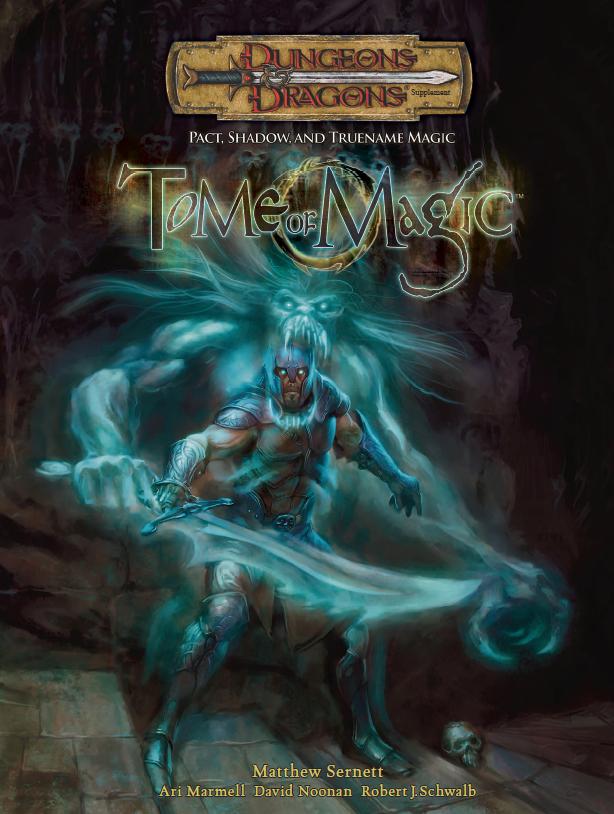
No you can't do this. You can do something similiar to this but 'Devil Trigger: Yamato' isn't on the Wizards spell list, sorry.
Tome of Magic wasn't as good as Tome of Battle, but the idea was the same, figure out a way to place magic and melee on equal footing while making sure that they both stayed 'cool' in different ways. The difference is that Tome of Magic has three complete different ways of doing that and only one really succeeded. Between the rest, one is 'okay' if you use some unofficial errata and the other barely functions if and only if you are completely optimized, and even then 1/6th of it's class features don't even work because the rules for how they function weren't printed until the official errata document.
Conveniently enough that's the order they're listed in the book, so let's get started.

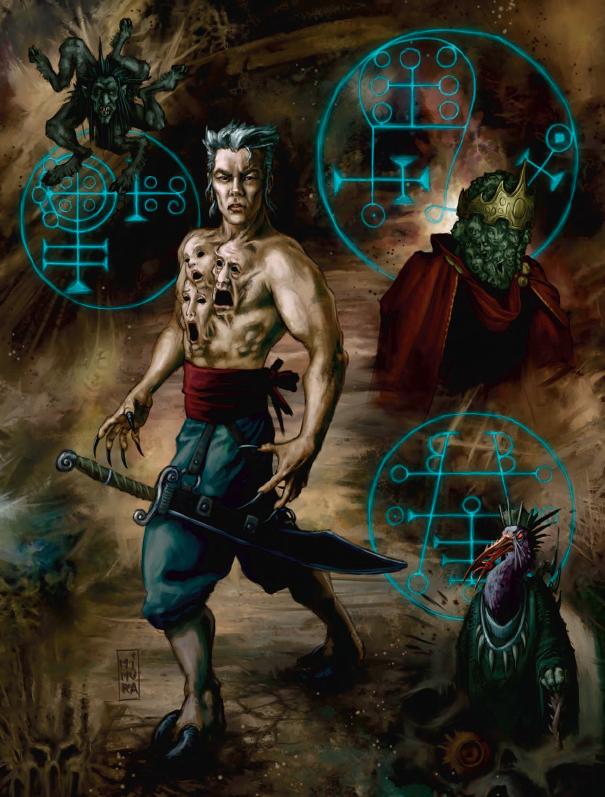
This? This you can do.
While Pact Magic as it's own 'thing' is new, the book points out that lesser pacts happen in magic all the time. It can be a pact with yourself to uphold an ideal. Such as in the case of a Monk, if you ever step off the path to enlightenment you can never get back on. Or it can be a pact with a Deity. By placing their souls into the hands of a higher power Clerics and Paladins gain strength, but if they forsake that pledge they can only continue with the Deity's consent. There's also the more overt uses of Pacts such as using Planar Ally to get an outsider to do your dirty work, or Geas to force someone to do your bidding or face the consequences. But Pact Magic (or more specifically Binding) is something different entirely. You aren't making a pledge with yourself, or an outsider, or a god. You are making a Pact with a vestige.
Vestiges are the remnants of once living souls that are trapped beyond the borders of Life and Death. Whether they were mortal souls strong enough to shatter the cage made by death, wayward outsiders too willful to cease existence, or dead gods unwilling to lie peacefully in their astral graves, they are all outcasts of the Cosmos. They dwell in a place no one can reach and exist in a manner no one really comprehends. The eternal distancing from reality drives most vestiges mad and twists their views of all beings, even themselves.
Because they exist beyond life and death, the Gods are unable to do much about them. Paradoxically, any mortal with a strong enough will and knowledge of their symbol and title can summon a portion of the vestiges forth to bind them to their very souls. For their part vestiges always answer the call of a binder strong enough to hold them because they are so desperate for even the slightest taste of reality and a respite from the void. Anyone can draw a vestige's seal, but only someone capable of hosting a vestige has any hope of calling one forth.
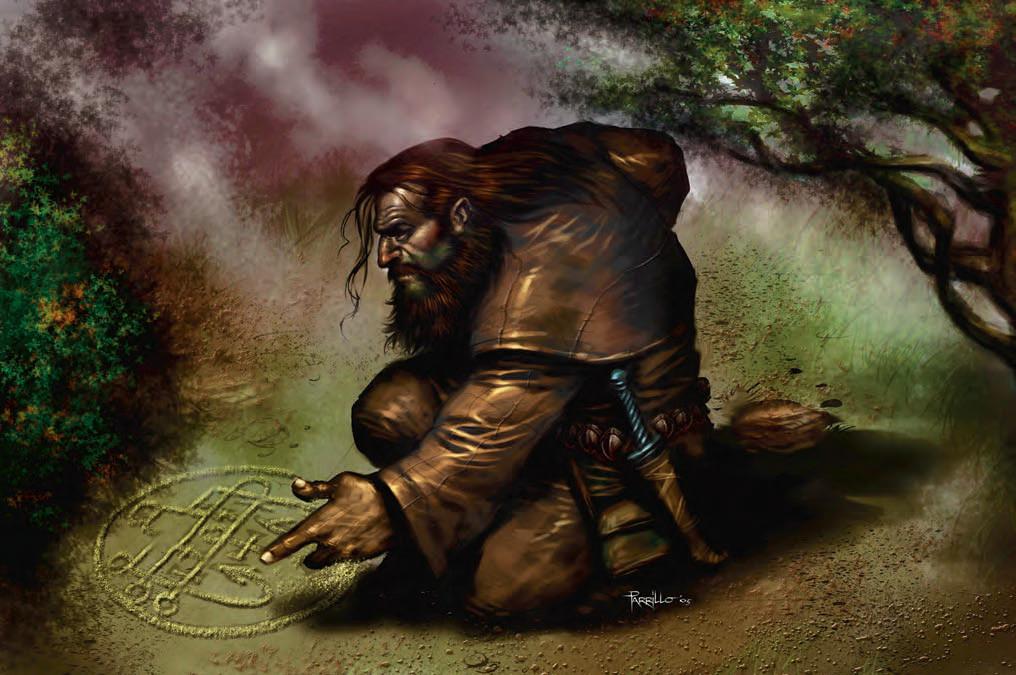
Did I mention that the art for this book is on the whole pretty good? Cause it is.
Immediately after drawing a seal the prospective binder must ritually invoke the desired vestige's name and title. The origins of the name and title are usually associated with both it's previous existence and it's current state. They can change over time but usually only rarely and even then binders with the proper information can usually interpret or even anticipate these changes. Once the vestige is manifest, a binder must formally request a pact. The general terms are always the same no matter the vestige, to gain its power a binder must agree to host it for a period of 24 hours. Once the pact is agreed to a contest of wills takes place between the vestige and its binder. This is the vestige trying to leverage more control over the bargain, and can be played out as an argument, a staring contest, a riddle, anything. If the vestige wins it can control how the binder acts and punish him if they stray. If the binder wins, the vestige comes along quietly.
Once the pact is made the two are inextricably bound. A shard of the vestige's soul binds with the binder's spirit, creating a link so tight that their body warps to display some sign of the vestige's presence. The inconvenience of these signs are usually minor and more than worth it to gain access to the powers the vestige grants. Because vestige magic is easy, it requires no components, no magic words, no complicated gestures. If the ability is within the vestige's purview, the binder wills it to happen and it does.
Those who practice Pact Magic are quick to point out how easy it is. You do not need to beg, a vestige never refuses a pact. Once you've learned the basics the only real difficulty is how much control the vestige gets in the situation. Of course the ease at which Pact Magic is learned and the fact that it by definition requires the mingling of your soul with something beyond reality and understanding has put it at odds with most Religions. Many churches actively hunt binders and do what they can to eradicate evidence of it to prevent the faithful from learning that beings can exist beyond the gods reach. This general condemnation in polite society makes discovering binding difficult, even if it's easy to master.
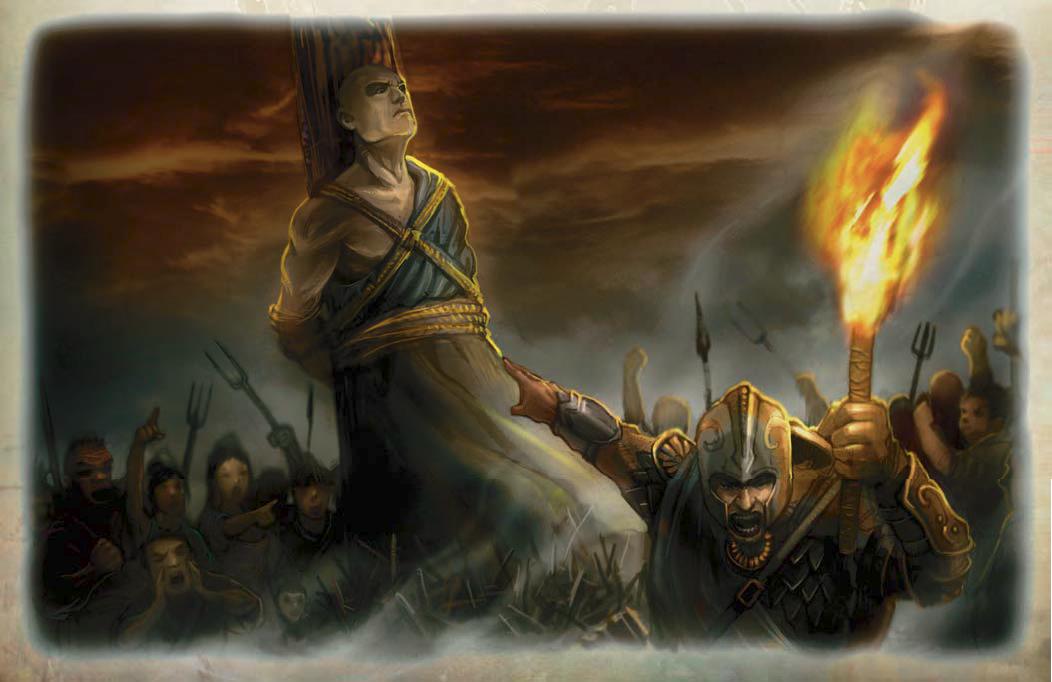
Jozan why? I thought you were cool.
Many binders are defrocked priests or acolytes who took up pact magic after discovering the rituals in heretical texts kept hidden in secret libraries. Others take up the art after discovering lost tomes in ancient ruins. A few gain their knowledge from other binders but the secrecy their art necessitates makes this unlikely.
Now let's have some mechanics
The Binder Class
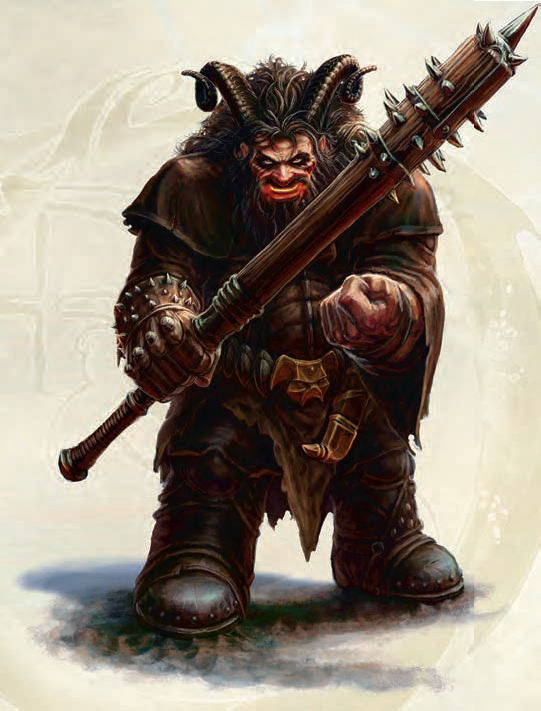
"I call upon you, Amon, the Void before the Altar. Render unto me your sight and your breath, for I stand before your seal and possess your talisman."
So first they get the standard ability score/race/alignment stuff out of the way. As far as ability scores, Cha is the most important, as it controls the DC of your abilities as well as your ability to make a good pact I.E. win the test of wills. They say that Con also affects the strength of your abilities but I can't remember if it does (e: there are two vestiges that have con based abilities so it a nowhere near as vital as they say), but you're as likely to be in melee as not so it's as valuable as it is to a cleric. They
then
go on to state that "Since you make both ranged and melee attacks Strength and Dexterity are also valuable, as is Intelligence so you have lots of skills." Which is mostly bull. You're more likely to make melee attacks than ranged attacks, there is only one vestige that focuses on bows, and two that use weapon finesse, and one of those boosts your dexterity anyway. Intelligence will let you shore up some skills, and there are certain vestiges that have minimum skill requirements. That said there are other Vestiges that will help you cover for skills you don't get. You do get most of the knowledge skills, as well as intimidate, bluff, and diplomacy. So it's not like your skill points are going to be wasted if you do put a higher int in here.
As far as races are concerned, well. "If you have a god, they probably hate you for even thinking about doing this." and every race has gods. So regardless of the race they're rare. There's a slight uptick with Half Elves and Half Orcs (even though Horcs have terrible stats for this) since they're already outcasts. For alignment, regardless of their previous existences, vestiges are beyond morality. And frankly beggars can't be choosers. But the act of binding and it's being contrary to most religions means most binders are iconoclasts, so neutral, chaotic neutral, neutral evil, or chaotic evil are the most likely candidates.
Binders get proficiency with light armor(not shields), simple weapons, and a d8 hit die. That doesn't sound that great but there are ways to shore that up pretty easily with the right vestiges and bonus feats. They get good Fort and Will and poor reflex, 2+int skill points, 3/4ths BAB, and have a starting age like a cleric.
There's then a full page description of Soul Binding which is an incredibly dry way to put "you are binding a dead god to your soul" but there's a few important bits in here. When you make a pact you roll 1d20+your 'effective binder level' + cha, that is your binding check and it takes 1 minute. You can rush it as a full round action by taking a -10 penalty but considering drawing a seal itself takes 1 minute you will probably never do this. If your check beats the DC of the vestige, you have made a good pact and that's it. If you don't you have made a poor pact and you are affected by the vestige's influence. While you're affected you must adhere to its restrictions to the best of your ability. If you willingly cannot or will not perform a required action or refrain from a prohibited one, you take a -1 penalty on attack rolls, saving throws, and checks until that vestige leaves you. These penalties can stack, and if you have multiple conflicting vestige prohibitions and you have to make a choice that makes one of them angry, too damned bad. While you're bound to a vestige you display their sign. It's not an illusory or shape changing effect, you flat out grow horns, or goat hooves, or extra faces on your body. It can be hidden by mundane or magical means as per normal. They cannot be removed from your body before the 24 hours are up except under extraordinary circumstances and they can only be suppressed by an antimagic field or similar effect. Every power granted by a vestige is supernatural, which means the dc is a straight 10+ 1/2 EBL + Cha. This means that the dinky level 1 powers are just as hard to resist as the level 20 ones. God bless good game design decisions. You can bind more vestiges to yourself as you level up, to a maximum of four at level 20.
Then there are the less straightforward class features. At 2nd level you can suppress/reveal the sign from any Good pact you've made as a swift action. 4th, 11th, and 18th level you get a bonus feat from a list that includes armor proficiency, shield proficiency, martial weapon proficiency, and any binding related feats. also at 2nd level you get pact augmentations. By drawing extra power from your vestiges you can give yourself a pick from a list of abilities, but most of them are worthless because "+1 insight bonus on saving throws" "+1 insight bonus to AC" and "+1 insight bonus on attack rolls" are on that list. by 20th level you can make five selections from the list and they do stack. At 6th level your vestiges are kind of attached to you, well, in more than the literal sense, and they don't want you to die. At first you're just immune to fear while bound to a vestige, eventually you get Slippery Mind, immunity to energy drain and negative levels, and immunity to mind affecting spells. Which is pretty sweet.
And that's it, like with a Wizard most of your crunch comes from your 'spells', which we'll get to later.
After that are the sections on how to play a Binder properly, which is mostly just repeating things they've already said just in the first person. As far as religion is concerned most binders are aware that the Gods were the ones who made half of the vestiges in the first place, so they are powerful. And while they may not be able to affect the vestiges, they can sure as hell affect the binder. So it's a good idea to at least pay them lip service and show respect to the servants of the divine. Other classes basically default to 'distrust', divine characters might want you dead, arcane characters respect your power but consider their own superior, other classes will probably distrust you if they see you summon a vestige, but they'll probably respect your abilities once you show off in combat.
As far as the rules for including binders in the campaign, the first part is obvious. "If you don't want them to be heretics that are hunted by anyone with a holy symbol, don't do that." There's a nice sidebar on heterodoxy and the fact that the Gods might trust their followers to make their own decisions regarding Pact Magic, so there might be one branch of the faith that hunts them and another that helps them or just doesn't care. You could also reflavor it as binding angels or ancestor spirits to yourself if you find the idea of vestiges unpalatable, though in that case you might want to change their names.
Up Next: Vestiges
or at least some of them
there are 32
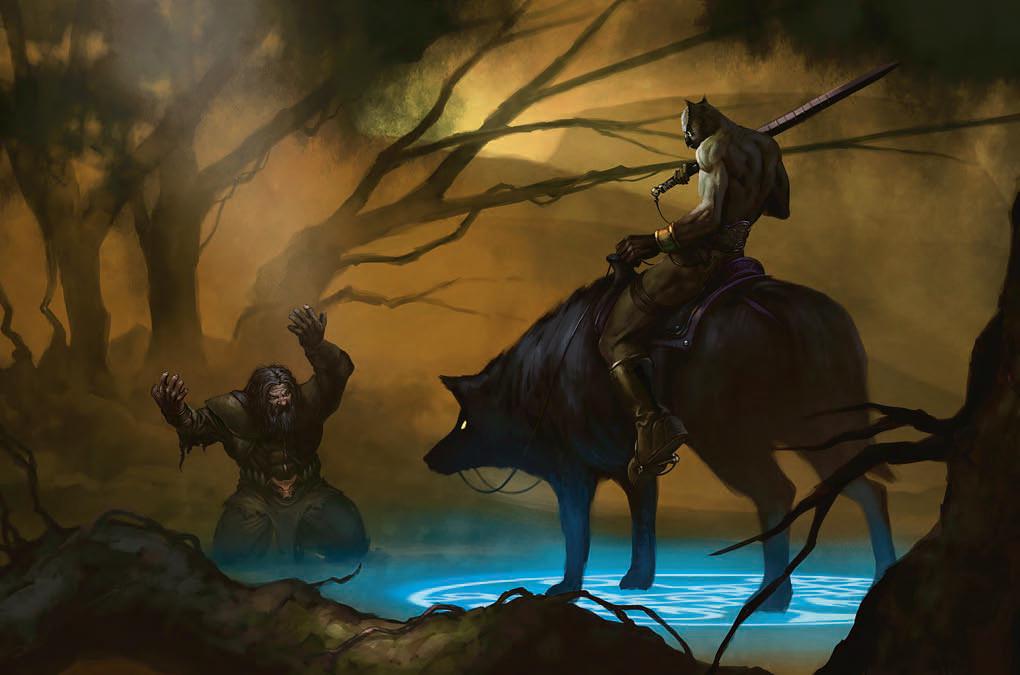
This guy definitely
Vestiges (Levels 1-4)
Original SA post
Vestiges: Level 1-4(and a half)
They have the vestiges listed alphabetically rather than by level, which really doesn't help you figure out their relative power levels and abilities. So I'll do em by level. I'm nice like that. Each vestige also has a seal, it's kind of neat that the ones from the Key of Solomon use the seals from the Key of Solomon, anyways, let's get started.
One thing to note that is a common thread amongst most of the vestiges, once you use one of their abilities that isn't a constant thing, you usually can't use it again for five rounds.
Level 1 Vestiges
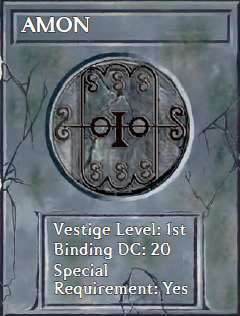
The Void Before the Altar
Legend: Scholars claim that Amon is what remains of a god that died of neglect millennia ago. Once worshiped by thousands as a god of light and life, he lost his worshipers to more responsive deities. He had a strong enough will to resist dying completely, and his existance as a vestige has twisted him into a foul tempered and hateful spirit.
Special Requirement: For some reason, Amon doesn't like Chupoclops, Eurynome, Karsus, or Leraje. If you've hosted one of those spirits in the past day, Amon will not answer your call, and they will not answer your call if you're bound to them.
Manifestation: He manifests in a burst of black smoke, howling foul curses at his summoner for daring to awaken him. He posesses a black wolf's body with a ram's head and a serpent for a tail. His mouth is filled with sharp teeth and fire escapes when he speaks.
Sign: You grow Ram's Horns.
Influence: Amon makes you surly and irritable. He also despises living deities of fire, sun, and law, and requires you to resist even beneficial spells cast by those devoted to such gods. Meaning you have to make a saving throw even if you don't want to.
Granted Abilities: He grants you darkvision, the ability to breath a line of fire, and the ability to attack with your horns. And yes you can charge with them for extra damage.
Opinion: Amon is basically babby's first Vestige. The vestiges he disallows you from using range from 'sort of okay' to 'pretty damned good' so once you have the ability to bind multiple vestiges or higher level ones you're probably going to leave him behind. Regardless of how much damage the fire breath deals. The influence is flavorful but annoying since it rules out ever popular deity Pelor, and you're unlikely to hit the dc 20 at low levels.
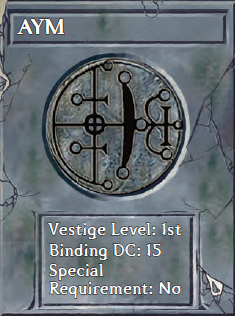
Queen Avarice
Legend: Not long after Moradin created the dwarves, Aym arose as a great leader amongst them. She was of course greedy as hell, driving her subjects to mine furiously to sate her lust for wealth. As destructive as her rule was, she did expand the dwarves territory greatly with her mining and many clans grew quite wealthy.
The orcs, giants, and goblinoids were jealous of the dwarves wealth and angry at the territory they lost, so they banded together and assaulted her kingdom. The dwarves were stretched thin across their wide territory and they could not respond quick enough to defend their capital. Legend has it that she died counting her money as it was loaded onto wagons for her flight, even as it melted in her hands. Rather than repenting for her greed she cursed Moradin for not protecting her, so Moradin cast her out of his realm.
Manifestation: Aym arises from a coiled heap within the seal. She has two great worms for legs and three heads - one a lion's one a female dwarf's and one a bull's. She's heavily muscled due to all the gold finery she is wearing, and her fingers glitter with a few dozen jeweled rings. In one hand she holds a star shaped branding iron and with the other she holds the lion's head shut. She can only speak out of the dwarf head, and she keeps the lion muzzled because it's roaring causes the bull to shriek in terror and then she just can't hear anything.
Sign: When you bind Aym you get a star shaped brand on either your forehead or your palm.
Influence: Surprise, you become greedy, and you must whine about every item of value you are forced to give to another. Even if it's to buy something. At the same time you must give a coin to a dwarf you meet within a minute of learning their name.
Abilities: You get a dwarf's ability to move in armor, you can wreath yourself and your fists in fire, you can deal loads of bonus damage to objects, and get medium armor proficiency.
Opinion: Aym is more specialized on defense than offense. If you want to be a sunder monkey and be both harder to hit and a bad idea to hit, Aym's probably your choice. But it's not going to help you kill anything any faster.
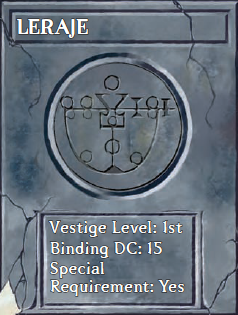
The Green Herald
Legend: Leraje was Corellon's first herald, like 'when Lolth was still chaotic good' first. She was so good with a bow that she shot all 1000 heads off of Thessala the Hydra Queen with a single arrow. One day, she helped Corellon save Lolth from an ambush by Gruumsh. Lolth praised Leraje for her skills, comparing her favorable to Corellon. Leraje beamed and a bemused Corellon proposed a contest between the two of them to see who was the better archer. When Leraje agreed Corellon declared their target: her heart.
Corellon expected her to realize that she was being an egotistical idiot but, well, she was an elf. She loosed her arrow at Corellon and, surprised he fired back. But she was aiming at his arrow, not at him, it ricocheted off of the arrow and back into her own heart. As punishment for wasting her life for the sake of her pride Corellon cast her soul from heaven and earth.
Special Requirement: To summon Leraje you must break an elf crafted arrow while invoking her name and title. Also she's one of the ones who hates Amon.
Manifestation: Leraje appears before her summoner as if she had always been there, just very well camoflaged. First her eyes open, then yellowed teeth in a sly smile. As she moves her clothes and skin change to reveal an elf dressed in beautifully decorated green leather armor. Although she was clearly beautiful at some point she has been ravaged by some toxin or disease, leaving her hair limp and yellow and her skin pockmarked and sallow.
Sign: You look sickly and diseased.
Influence: You become quiet and unassuming. Leraje still feels guilty about the actions that lead to her death, so she requires that you never attack any elf or creature with elven blood, this includes drow.
Granted Abilities: You gain the ability to hide pretty well, low light vision, precise shot, proficiency with bows, and the ability to ricochet arrow shots.
Opinion: Leraje is the only vestige that values ranged weaponry in any fashion. It might be okay at lower levels when you're more fragile but unless you're planning on binding her forever you're better off with one of the other vestiges.
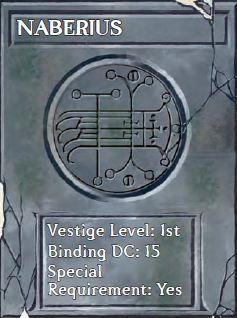
The Grinning Hound
Legend: Naberius' name has changed multiple times over the years. Naberus, Kaberon, Cerbere, and Serberius. One appeared as a noble bird headed man, another as a dog with a crane's head, another as a wolf with fifty heads and a tail of three entwined snakes, and the fourth as a heap of bodies surrounded by a cloud of flies. A few fiendish sages have suggested that he might be an aspect of Cerberus, but Naberius just smiles when asked about it.
Special Requirement: Naberius values knowledge, industry, and willingness to deceive. He required you to have at least 4 ranks in bluff, or any knowledge or profession skill.
Manifestation: First a black crane falls onto the seal with a squawking and flutter of feathers. Naberius then stalks forward out of invisibility as a three headed hound to feast upon it. He speaks from whichever head isn't eating at the moment. Despite his appeareance and raucous voice, he always seems amiable and eloquent.
Sign: Your voice acquires a gravelly tone.
Influence: You love the sound of your own voice and are constantly pleased by your cleverness. Whenever presented with a stage, pulpit, talking stick, or anything else that gives a speaker the floor you are required to immediately sieze the opportunity to speak. Any topic will do but Naberius also resents others taking control of the discourse so he requires you to shout them down or mock them until you've spoken for at least one round per binder level.
Abilities: You can cast disguise self, gain the ability to use a number of skills equal to your con modifier as if you were trained in them, can use the Command spell (which upgrades to suggestion later on), can take a 10 on diplomacy and bluff checks and make rushed diplomacy/bluff checks without penalty, and oh yeah, you heal 1 point in every damaged ability score every round and one point in every drained score every hour.
Opinion:
 Naberius. If you've spent any time doing 3.5 char-op you've probably heard of Naberius. WotC liked to use ability score damage as limiter on the more powerful things that classes had access to. Particularly constitution damage. A one level dip into Binder lets you snag Naberius and completely negate that. In particular he enables a warlock build that deals somewhere in the neighborhood of 42d6 damage a round. To a full strength binder, however, he's less great. Getting access to suggestion and disguise self are okay, but the 'trained skills' thing means nothing without actual skill ranks at higher level.
Naberius. If you've spent any time doing 3.5 char-op you've probably heard of Naberius. WotC liked to use ability score damage as limiter on the more powerful things that classes had access to. Particularly constitution damage. A one level dip into Binder lets you snag Naberius and completely negate that. In particular he enables a warlock build that deals somewhere in the neighborhood of 42d6 damage a round. To a full strength binder, however, he's less great. Getting access to suggestion and disguise self are okay, but the 'trained skills' thing means nothing without actual skill ranks at higher level.
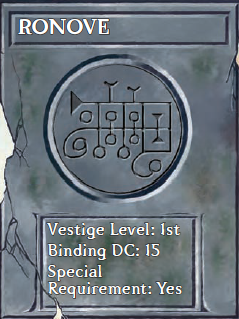
The Iron Maiden
Legend: Ronove is supposedly the first monk. In life she was a charismatic guru who taught that enlightenment comes from denial - first of the needs of the flesh then of the perceived limits of reality, then of the rules of reality. And she had the ability to back up her claims. She leapt from cliffs without harm, lifted boulders with her thoughts, and lived for months without eating or drinking. But even though she could do all these amazing things she could not teach them to her students.
To prove the veracity of her teachings, Ronove sealed herself in an iron coffin and ordered her students to bury her and only dig her up once they received a sign from her. Years passed without a sign, and her followers lost faith one by one. At last only one remained, and he dug her up in disillusionment only to find an empty rusted sarcophagus. He tracked down his fellow disciples to tell them of the miracle but none believed him. Were it not for this last disciple all knowledge of her would have been lost, but he scribed her story on the walls of her monastery for binder scholars to find years later.
Special Requirement: Ronove's seal must be drawn in the soil under the sky.
Manifestation: The ground quakes and a rusted iron sarcophagus erupts from the soil within the seal, shedding dirt and flakes of rust as it rises upwards. The metal visage of a human woman is discernable upon the lid. The metal bindings holding the lid closed burst in clouds of rust and it creaks open releasing a tumble of human bones and noisome black liquid. Ronove does not speak to her summoner but the visage on the lid smiles or frowns during the pact making process.
Sign: Your face forms into a permanent frown if you made a good pact, or a smile if you made a poor pact.
Influence: Ronove makes you think that others always doubt your abilities and competence. You feel you must always prove your worth. In addition you cannot eat or drink while bound to her.
Abilities: You gain a bonus to your land speed, a monk's unarmed strike feature (with the included increase in damage), the ability to treat your melee attacks as magic/cold iron, a permanent feather fall, and the ability to manipulate things at a distance ala Far Hand. You can deal damage with this but if you do it gos on cooldown like any other 'use' ability.
Opinion: Getting most of the good stuff out of being a monk isn't half bad for a vestige. The fact that the unarmed strike damage scales up rather than just being a proficiency means it remains relevant.
Level 2 Vestiges
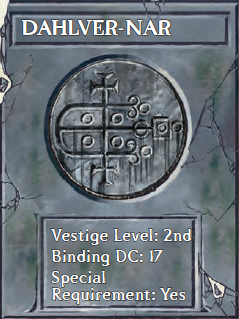
The Tortured One
Legend: Bards tell two stories of Dahlver-Nar, both linked to the magic items that carry his name - The Teeth of Dahlver-Nar . Some say that because he was one of antiquity's most powerful clerics, his followers treated his teeth as holy relics after his death and they gained power through veneration. Others insist that he was a cleric of little consequence and he found the teeth in a red dragon's lair. The teeth are named after him because he used them to terrorize the townsfolk.
Binders know different, Dalhver-Nar was a powerful cleric at one point but he forsook his god to pursue pact magic. The teeth are neither his nor those he found in a red dragon's hoard, they are the teeth of beings that became vestiges after death and they could grant abilities similar to those of the vestiges they came from. Binder scholars state that Dahlver-Nar removed all of his teeth and replaced them all with those of vestiges, but being bound to so many at once drove him mad. What happens next is up to debate but he eventually died and his teeth were lost, divided up amongst the squabling of whatever followers he had managed to retain. Now he is a vestige in his own right, perhaps by being brought so close to vestiges before his death.
Manifestation: Dahlver-Nar floats above his seal, arms and legs hanging limply. His skin is the flesh of gums and teeth studd his body, replacing his eyes. The only place there aren't teeth are his mouth, which is a bloody ruin. He only speaks in a tortured moan.
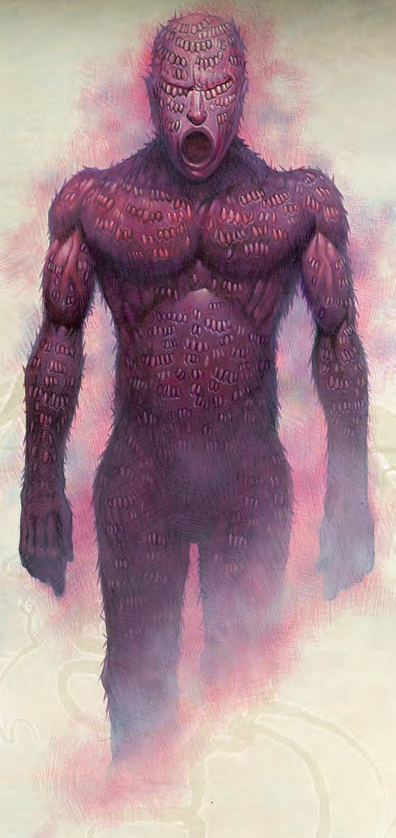
Sign: Several teeth grow in through your scalp, they're small enough to be hidden by a large quantity of hair or a hat but if someone's feeling your hair they can find them.
Influence: Being bound to Dahlver-Nar prevents concentration, as you are often distracted, so any action that requires a Concentration check is impossible.
Granted Ability: Dahlver-Nar makes you immune to wisdom drain, damage, madness, insanity, and confusion effects. You can also emit a moan that dazes everyone around you, you get half your constitution as a natural armor bonus(here's the other vestige that has anything to do with con), and you can split the damage you take with any one creature within a certain range, though they get a save if they're unwilling.
Opinion: The damage splitting is pretty great, and the daze isn't bad either. The fact that it lacks a traditional damage ability lowers it's usefulness but only slightly.
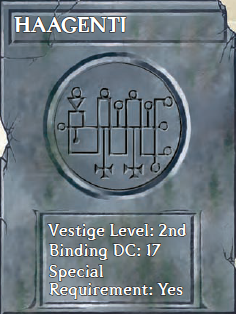
Mother of Minotaurs
According to Frost Giants, their primary diety Thrym had tried to force a goddess of the humans to marry him and failed when her brother disguised himself as Thrym's bride and disrupted the ceremony. The angry and humiliated god consoled himself with dalliances among his giant worshippers. Haagenti, a hill giant sorceress, learned of his liasons and used a spell to transform herself into a beautiful frost giant so that she could bear his powerful half-god children. Her ploy succeeded and a year later she gave birth to twin sons.
Once a few years had passed and the children of his dalliances had grown old enough, Thrym set out to visit and test them all. He fought each child to see who was the strongest and bravest and invited the most fit to join him in Jotunheim. When he sought out Haagenti, he found her herding cattle in the warm lowlands and became enraged when he saw her true form. But when he raised his axe to fell her two horribly ugly giants leapt to her defense. He realized to his disgust that they were his sons. He would have killed them right then and there but he realized that Haagenti had taught him a valuable lesson. His failed attempt at marriage had been fouled by a beautiful form crafted by trickery, and he fell victim to the same ruse once again. Rather than kill Haagenti and her children, Thrym cursed them to resemble the cattle with which they wallowed. Then he left, vowing to teach his frost giant worshipers to distrust all beauty.
How Haagenti became a vestige is unclear but lore holds that her guilt at ruining beauty for frost giants was so great that she could not rest in any realm that contained beauty of any kind. As every place in the planes is beautiful to someone, she found no home anywhere and disappeared into the void. She refuses to speak on the subject and becomes angry when questioned about her past.
Special Requirement: You must be large or speak giant.
Manifestation: A huge icicle thrusts up from the ground within the seal. A blurry white form can be seen moving iwthin for a moment, then she spreads her arms and shatters her icy prison. Although she appears with her back to the summoner, her form is clearly that of a winged minotaur. She waves her shield and battleaxe to disperse the cold mist around her, then turns to face her summoner revealing her bull like face and icicle beard. Though she doesn't appear to be female her smooth voice is quite feminine.
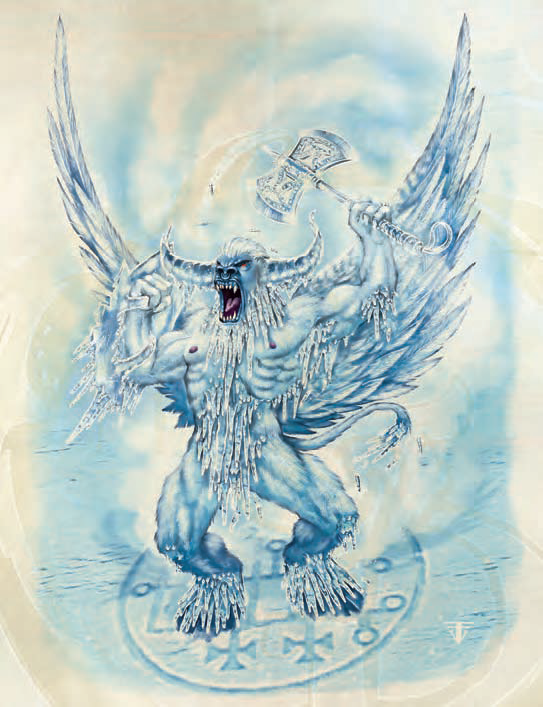
Sign: You possess the same features you always did but you're just slightly uglier. Others easily recognize you but there are small differences that make you less attractive. In addition your bulk expands until you weigh half again as much as you did before.
Influence: You are ashamed and bashful in the presence of beautiful creatures. In addition you must give deference to any creature you perceive as more attractive or charismatic than yourself. How you do so is up to you but you must constantly treat such a creature with respect or suffer the penalty for defying Haagenti's influence.
Powers: You gain proficiency with all shields, as well as the battleaxe, greataxe, handaxe, and throwing axe. You're immune to transformation effects unless you wish to be, and you can confuse people with a touch. At higher levels you instead cast Maze at a touch.
Opinion: Free heavy/tower sheild prociency is a nice way to shore up your AC, and battleaxes are decent weapons. Confusing is okay but then all of a sudden at level 19 you can just make people stop existing for a few rounds, which is amazing.
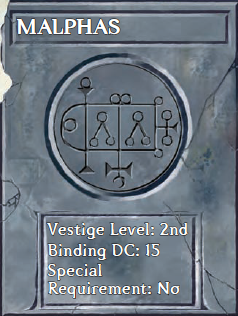
The Turnfeather
Legend: Only those elves who know their history well are familiar with Malphas, a lesser scion of an ancient elven kingdom's ruling family. Malphas joined a druidic order under pressure from his elders, who hoped that enforced dedication to nature would teach him a greater respect for their traditions and the elven way of life. After a contentious start, the plan seemed to work. Malphas, always the black sheep of the family, soon became a model member of the elven nobility. His trademark, a white dove's feather, could be found at sites where good deeds had been done, though no one ever saw him perform them.
This was all part of Malphas' act. While studying the druidic traditions he met another elf druid - a female who won his heart with guile and promises of power. Together they hatched a plan to make Malphas heir to the throne. While his white feathers turned up wherever good events were occuring, black feathers began to appear on the murdered corpses of royalty. Elf diviners soon discovered that Malphas was at the root of their troubles, and the traitorous elf was forced to flee.
Malphas flew to his lovers hideaway among the trees, intending to warn her and flee with her. But when she heard his story she flew into a rage, mocking him for his stupidity and overtures of affection. To wound him even more deeply she revealed her true form - that of a drow. When the authorities finally found Malphas he lay dead from the breaking of his heart and loss of his soul.
Manifestation: Malphas begins his manifestation with a furious fluttering of white doves. The flock explodes out of thin air then fly away from each other and fade from view, revealing a handsome male elf clad in black. Malphas has pale skin, black eyes, and black feathers for hair. His smile reveals black teeth and a snakes tongue. He wears a nobles suit in funerary black, and a cloak made of ravens heads and feathers hang from his shoulders. If he moves too much the heads begin screaming, so he makes only small gestures with his hands. His voice is hoarse and he croaks when he speaks, which annoys him greatly.
Sign: Your teeth and tongue turn black.
Influence: You fall in love too easily. A kind word or a friendly gesture means you must devote yourself entirely to that person. But don't worry, your broken heart mends as soon s the next person smiles at you. Also: you must use poison if you have access to it.
Abilities: You can summon a dove or raven to scout for you, turn invisible, use poison without risking poisoning yourself, and gain the ability to use sudden strike.
Opinion: Sudden Strike is a poor man's sneak attack, the ability to turn invisible every 5 rounds means that you'll get at least some use out of it. Poison use's value depends on the poisons you have access to.
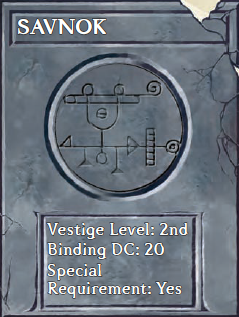
The Instigator
Legend: Savnok lived before recorded history, and his story contains as much myth as it does fact. According to the legend, Savnok served Hextor and Heironeous before the two half-brothers came to blows. They were charged with guarding their mother's arms and armor while she was with her lovers. Both Hextor and Heironeous were awed by their mother's implements of war but neither dared disobey.
Seeing their desires written clearly on their faces, however, Savnok devised a means to steal the items for his masters. Relying on their trust in him, Savnok tricked them into letting him guard the armory. But once his gaze fell upon the goddess' armor, he could not resist donning it. Just touching the metal made him drunk with power. After putting it on he knew he could never take it off, so he fled the godly realms with it.
Hextor and Heironeous soon noticed that their servant and the armor were missing. When they looked for him they found him at war on the material plane. Since no energy or mortal weapon could pierce the divine armor, he decided to set about carving a kingdom for himself. Shocked at his betrayal and horrified at their own failure to perform their duties, Hextor and Heironeous appeared before Savnok and ordered him to relinquish the armor. He responded by attacking them, and while he could not harm them, neither could they harm him.
Heironeous flew into the sky and tore thunderbolts from the clouds to hurl at him, but Hextor, realizing that they needed deific weapons to defeat the armor, fled to the armory and stole a bow and a handful of arrows. Hextor barely had the strength to draw his mothers bow, but with each arrow he fired a dozen missiles streaked down to strike Savnok. They had little power behind them but they still managed to pierce his armor. While he raged at the injustice the two gods had done him he slowly bled to death from dozens of small wounds. When at last he lay dead, the gods removed the armor and debated what to do next. Not only had they failed to guard the armory, but Hextor had stolen her bow. It was Hextor that suggested they hide the body and replace the items, leaving their mother none the wiser. Heironeous objected but he was at much at fault as Hextor was. Together they hid Savnok in a place even they could not reach. Heironeous has regretted the decsion ever since.
Special Requirement: You must have stolen something and not made reparations or apologized for the act.
Manifestation: An arrow streaks out of nowhere and strikes something unseen above the seal, then a dozen more. Trickles of blood sprout into being where the arrows hang, outlining a heavily armored form that's too broad and powerfully built to be human. His features are obscured by the helm and the blood. When he speaks, he spits out bitter words with a gravelly voice that's heavy with resentment.
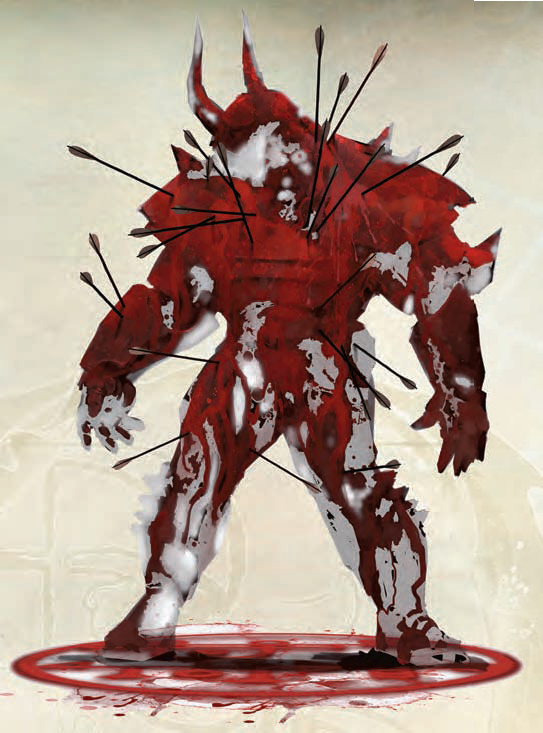
Sign: A piece of an arrow appears under your skin somewhere on your body, like your skin has healed over a broken off arrow that has previously injured you. It doesn't damage you but it is uncomfortable, and replaces itself if removed.
Influence: You are headstrong and recalcitrant. once you make up your mind very little can change it. Also once you don armor, employ a shield, or wear anything else that improves your armor, Savnok requires that you never remove that protection for any reason.
Abilities: You can swap places with a willing ally, gain heavy armor proficiency, and summon a suit of full plate armor. It starts out as just masterwork but it eventually scales up to +4 heavy fortification. And as long as you're wearing it you also get damage reduction /piercing.
Opinion: If you want to be a tanky binder, Savnok is the way to go. Even though the ability to swap places is on a 5 round cooldown, it helps cover for your lowered speed in heavy armor immensely. In addition since it's straight up teleporting it doesn't provoke attacks of opportunity on either end. Meaning you can save your mage from someone that broke the line of defense.
Level 3 Vestigs
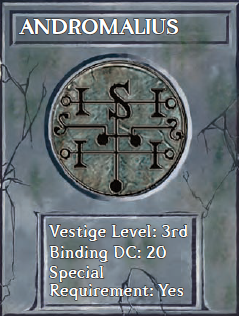
The Repentant Rogue
Legend: Once a herald of Olidammara, Andromalius foreswore theft and mischief on his deathbed, repenting all the actions he had taken on behalf of his god during his life. In this way he hoped to steal his soul from his deity, thus accomplishing the greatest theft and prank in history, and proving himself most worthy of his god's favor.
At first angered by his betrayal, Olidammara quickly realized the irony of the moment and burst into laughter. But his humor was short lived because he realized that to accept ANdromalius' soul would be to prevent the theft and ruin the joke. Since Olidammara was loathe to let such a clever servant go to the realm of some other god, he repaid his servant's honor a hundredfold - he stole Andromalius' soul from the cosmos, making it a vestige. Whether he deems this result an honor or not is unclear.
Special Requirement: You must obtain two different nonmagical items similar to those that Andromalius holds in his hands when he manifests and place them within the seal. They vanish as soon as he appears
Manifestation: Any textual description really can't do this justice.
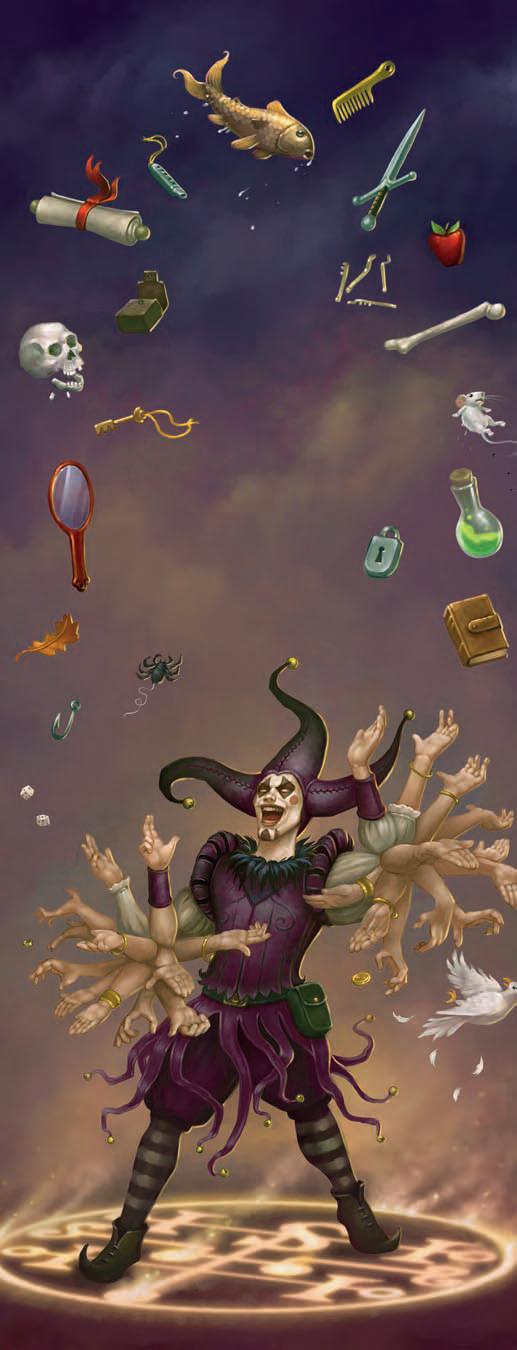
When he returns from whence he came he tosses one of the items to his summoner. Meaning you've always got a net loss of at least one item.
Sign: You grow an extra digit on each limb. This appendage prevents you from wearing normal gloves or gauntlets but magic items reshape to fit you.
Influence: You become a devious mischief-maker who delights in causing small calamities - especially misunderstandings between friends and acts of mistaken identity. However, Andromalius cannot now abide acts of theft, so he forbids you to steal from a creature, take an item from a dead body, or remove someone else's possession without permission so long as you are under the jurisdiction of an authority whos laws expressly forbid such activities. By the same logic you cannot take possession of any object you know to be stolen.
Granted Abilities: You can cast Tasha's hideous laughter as your 5 round ability. Cast Locate Item and See Invisibility at will, You have a +4 bonus on sense motive, appraise, and spot checks to oppose disguise checks, as well as automaticaly noticing when someone steals something from you. As well as for-real Sneak Attack.
Opinion: His requirement/manifestation thing mean you need to keep a couple dozen crazy kitchy items on you at all times or it's a good incentive to take the 'ignore special requirements' feat if you haven't gotten that message yet. Sneak attack is the real winner here, everything else is gravy. Including the fact that you can cast Tasha's Hideous laughter to set up Sneak Attack opportunities. He's more or less a straight upgrade to Malphas just without the poison use and birds.
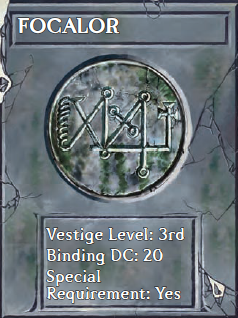
Prince of Tears
Legend: What Focalor was before he was a vestige is up to some debate. Some say he was once a demon, others that he was an angel. The constantly crying spirit has never uttered a coherent word, so binder scholars have had to look elsewhere. All agree that he was an immortal creature that died of grief, and his immense anguish prevented him from being reabsorbed into his plane of origin. Why he is so sad is unknown.
Special Requirement: His seal must be drawn with liquid.
Manifestation: A single tear drops from thin air to strike the ground. Next his weeping eyes appear and gradually his whole body becomes visible. Focalor looks like a handsome human male who's face is twisted by grief. He wears no clothes but he cloaks his body in griffon wings that grow from his back and shudder with each of his wracking sobs.
Influence: When influenced by Focalor you feel some of his inestimable grief and must act morose. Rarely smiling or finding cause to laugh. Whenever you kill a creature, Focalor demands that as soon as you have a peaceful moment, you must take a round to say a few words of sorrow and regret for the life cut short by your actions.
Abilities: All adjacent creatures are overcome with grief, taking a -2 penalty to basically every roll. You can blind targets, call down lightning bolts from nowhere, and breathe water.
Opinion: The lightning strike means that Focalor is the next 'caster' vestige, but the aura means you want to stay near enemies but away from allies. Blinding people isn't bad either. Neat thing about the lightning strike is it isn't on the cooldown (the blinding is instead) and you don't have to be outdoors to do it. Somehow you can make lightning strike someone in an underground lake and not electrocute yourself because magic that's why.
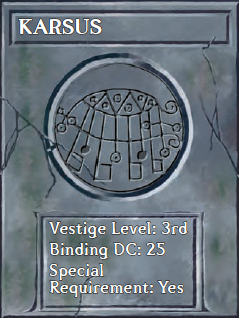
Hubris in the Blood
Legend: Karsus was a powerful mortal spellcaster who attempted to steal the powers of a deity of magic. He succeeded but realized too late that the mortal frame and soul cannot handle the powers of a god. He died and what remained of his soul clung to the mortal plane for ages, never becoming a petitioner. With no planar home and no deity to claim his soul he became a vestige.
Special Requirements: Karsus refuses to appear within the area of an active spell, he also requires his binder have at least 5 ranks in Know(arcane) or Spellcraft. He also hates Amon.
Manifestation: A great red boulder appears in the air over the seal, blood burbles from the top of the stone in rivulets down the side facing the summoner then pooling on the ground. When he speaks the blood fountains upwards, varying based on the volume of his voice.
Sign: You bleed more than normal, a small scratch releases a flood of blood, this doesn't cause any extra damage though.
Influence: You are filled with Karsus' arrogance, you must use bluff or intimidate instead of diplomacy.
Abilities: He allows you to use spell trigger items as if you were a wizard, increases the DC of spell trigger items you use by 2. lets you use detect magic at a touch, and literally smell magic.
Opinion: Karsus himself is kind of an asshole but getting access to a wizards entire spell list as long as you can get an item for it is pretty great. So's at will dispel magic.
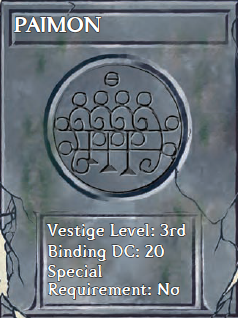
The Dancer
Legend: Paimon was an infamous lothario, he delighted in seducing noblewoman with his dancing and besting their suitors with his swordplay. He eventually crossed paths and swords with a particularly jealous and cruel fellow, sometimes identified as a human and other times as an elf. After he humiliated this nobleman in front of his peers on several occasions, the fellow enlisted some of his other aggrieved suitors to capture paimon and cut off his sword hand.
Paimon was not so easily defeated. When he recovered he returned to court wearing a bejeweled golden hand that he could replace with a rapier blade. He fought and defeated the man who had wronged him, but he spared his life only because he was interrupted by a request to dance by the object of both their affections. In response to this further humiliation, Paimon's foe again had him captured. But this time they cut off all of Paimon's limbs and replaced them with sword blades, daring him to return to court before leaving him to bleed to death.
At the next royal ball, Paimon's foe and his conspirators smirked at every mention of their enemy's name and winked at one another when others wondered where he might be. Then a dark figure appeared amongst the dancers. Impossibly tall and shrouded head to toe in dark diaphanous cloth, the wraith-like figure began to spin. Disturbed by its appearance, the other dancers moved away. When one of them spotted naked steel beneath the whirling cloth they began to flee the hall.
Enraged that his party had been interrupted, Paimon's enemy went up to the figure and tore away the cloth. For a moment the tortured figure of Paimon stood before them with bloody blades for legs and arms. Someone screamed at the sight and Paimon faded to nothing. Thinking they had seen the ghost of Paimon, the men immediately went to find their foe's body and give it a proper burial, but it was gone. Instead they found a trail of blood and sword thrusts in the ground. Paimon was gone, banished by a woman's scream.
Manifestation: Paimon appears in a whirl, his form spinning like a top on an arm that ends in a metal blade instead of a forearm and hand. He turns counterclockwise so rapidly that his summoner can make little sense of what he sees. He quickly switches to an arm, and then a leg, with each switch he slows until at last he stands on one blade, balanced within the seal on a daggerlike point. His almost featureless gray body has a dancer's physique. His face is stretched to disfigurement around the right side of his head, and no ears are visible. Paimon speaks in a garbled voice from his twisted mouth while hopping from appendage to appendage, making small turns as though he is impatient to be whirling again.
Sign: One side of your mouth becomes wider than the other as though it were being stretched or pulled. It remains slightly open and causes you to drool.
Influence: Paimon makes you lascivious and bold. In addition you must dance(move at half speed) whenever you hear music.
Abilities: You get a +4 untyped bonus to dex, a bonus on tumble and perform(dance) checks, uncanny dodge, whirlwind attack, proficiency with the rapier and shortsword as well as weapon finesse with those weapons, and the ability to do a "move and attack every creature you move past" dance of death.
Opinion: Paimon is a fairly self contained package, you get weapon finesse, the dex to make it worthwhile, and proficiency with the rapier. As well as lots of "attack everything dammit" abilities to make it a worthwhile avenue to pursue. Of the Melee vestiges he's not strictly the greatest but he's not terrible.
Level 4 Vestiges
With level four vestiges you gain the ability to have two vestiges bound at once. Thus you can start thinking about combinations of abilities and how to compliment things well.
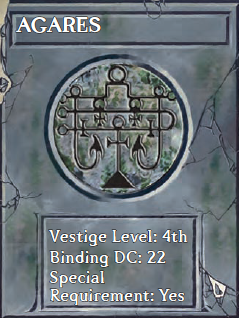
Truth Betrayed
Legend: In life Agares ruled over vast armies on the Elemental Plane of Earth. He was the most powerful general the plane had yet seen and second only in authority to his genie emperor, a dao of great influence. Even though Agares was unalterably loyal, he nevertheless gave his emperor reason to fear betrayal. Agares became obsessed with a Djinni commander who had thwarted his conquests on may occasions. His desire to meet his favored foe on the field of battle blinded him to other tactical options and deafened him to rumors that his esteem for his enemy had deepened into love. When at last Agares entrapped the Djinni's forces, he girded himself for personal combat and strode out to answer a challenge to duel his adversary. The summons was a trap set by his lieutenants, however, his allies slew him within sight of his greatest enemy.
Special Requirement: You must draw Agares' seal upon either the earth or an unworked expanse of stone.
Manifestation: The ground trembles briefly as the head of a great brown crocodile bursts forth from the seal. The maw opens upwards revealing a hooded black hawk that spreads its wings, forcing the jaws further apart with the mere brush of its feathers. Two large catlike eyes gleam on the hawk's breast. When Agares speaks, the hawk's beak moves but the sound comes from the crocodile's rumbling throat.
Sign: You gain a wracking cough that spews dust and small stones from your mouth, this prevents you from casting any spells that require speech. You can resist the urge to cough for a number of rounds equal to your con score, followed by a round of coughing before you can do it again.
Influence: You cannot lie, you must speak forthrightly and with confidence. You cannot use the bluff skill and if asked a direct question you must ask truthfully and directly.
Abilities: You gain a +1 bonus on attack and damage rolls if both you and the target are touching the ground, airborne foes take a -1 to the same rolls against you. You can shake the ground causing those near you to fall down, you can summon an earth elemental, you are immune to fear, and you can speak and understand all languages but cannot lie in a language you are not familiar with.
Opinion: You can summon an earth elemental more or less at will. It lasts until its destroyed and scales up to Huge at 19. Everything else is just gravy. Putting an extra combatant on the field is amazing, particularly if it's free and a giant sack of hit points.
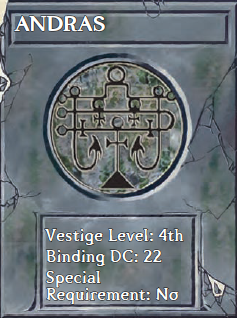
The Gray Knight
Legend: In life he was an elf paladin famed for his prowess in battle and his implacable dedication to doing what was right and good for all. A series of misjudgements and misfortunes broke Andras' faith in both himself and his diety, however, and he became a blackguard. During his subsequent service to the dark gods, his infamy rapidly outgrew his fame and his name was whispered in fear.
After nearly three hundred years of almost constant battle on behalf of both good and evil, Andras grew tired of both causes. In the midst of a duel in the key battle of a great war, he simply dropped his weapon and left, never to be seen alive again. Unwelcome in the realm of any god, he became a Vestige after death.
Manifestation: Andras rides out of nothingness on the back of a great black wolf. His head is that of an owl covered in gray feathers, and his gray skinned body resembles that of a muscular male elf. Wearing only a loincloth Andras slouches in his saddle, holding the reins of his mount in one hand and a greatsword, which lazily rests against his shoulder, in the other. At first glance he looks as though he might be asleep, but a closer inspection reveals a pair of great golden eyes glowering from his bowed head. Andras speaks in deep tones laden with malice.
Sign: You sprout two useless gray feathered wings from your back. They're small enough to be hidden under a shirt or cloak but it makes you appear hunchbacked.
Influence: Because Andras wearies of combat quickly, you must drop any items in hand and withdraw from combat after only 10 rounds of battle, you must wait 1d4 rounds before taking any offensive action.
Abilities: You can summon a mount, wield Greatsword, lance, longswords, and rapiers. You gt a +8 bonus on ride checks, the ability to force an enemy to attack his allies, improved critical with every weapon you wield, and the ability to smite good and evil.
Opinion: Smite good and evil means you are hitting almost everything worth hitting. It's a 5 round ability but it's otherwise unlimited. Improved critical, proficiency with some okay mounted weapons, and a reasonable bonus on ride checks are also nice. And the whole "making enemies attack each other" thing once every five rounds.
We're running out of space here so I'll leave the second half of level four for the rest of the vestiges.
Next time: Liches, fishwomen, death spiders, and gnomes.
Vestiges (Levels 4-8)
Original SA post
Vestiges, levels 4.5-8
Let's finish off the rest of the vestiges.
Level 4 Vestiges part two
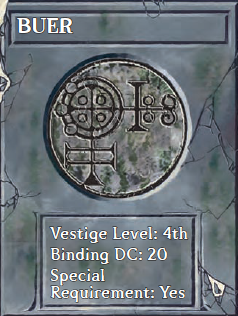
Grandmother Huntress
Legend: Buer tells many different stories about how she came to be a vestige, so her true origins remain obscure. In various popular versions of the tales she is a beautiful elf maiden who fell to evil satyrs, a virtuous human ranger killed by a chimera, or a green hag slain by a lammasu. It is likely that Buer herself cannot remember who she was in life or what brought her to her current state, and the stories she tells are cobbled together from what she can remember. Regardless of what her true form was most agree that she possessed great skill as a hunter and healer.
Special Requirement: Her seal must be drawn outdoors.
Manifestation: Buer's form is that of a five-branched star or wheel made of satyr legs. She has two faces, one positioned on each side of her wheel shaped body at the center point where the five legs meet. One face is that of a green hag, and the other is a raging leonine visage with an unruly mane and beard. Buer constantly moves within her seal, rolling from foot to foot as she traverses it's circumference. She always keeps her raging face outward, but she speaks from her green hag face in a friendly manner with a gentle voice. WHen her body rolls in such a way taht her hag face cannot see her summoner, Buer grows frustrated and begins yelling curses at her body.
Sign: Your feet turn into satyr's hooves, giving you a curious tip-toeing gait. If you don't have magic shoes then you won't be able to wear them while you're all satry'd up.
Influence: You are plagued by momentary memory lapses. For an instance you might forget even something as important as the name of a friend or family member. Furthermore, Buer abhors the needless death of living creatures other than animals and vermin, the first melee attack you make against such a foe must be for nonlethal damage. In addition, Buer requires that you not make Coup de Grace attacks.
Abilities: Buer grants you a bonus on heal, Know(nature), and survival checks as well as the Track feat. You gain immunity to all poisons and diseases, and grant that same immunity to anyone within 30 feet of you. You get fast healing and can heal a small amount from an ally with a touch.
Opinion: The big draw of Buer is the healing. Sure it's painfully slow (on the average it's 28 healing a minute) but it's completely free, and free healing is hard to come by in 3.5 (other than something that will show up later). Her immunity does cure any diseases/poisons on you but it only temporarily suppresses it on your nearby allies.
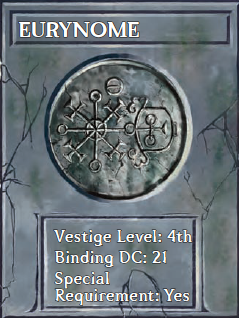
Mother of the Material
Legend: Before recorded time, when the gods and titans battled on the other plains. The Titan Eurynome tired of the struggle and fled to the roiling chaos that made up the Material Plane. She divided the world into sea and sky, and then danced alone upon the waves. Incensed by her impertinence in meddling with a world yet unformed, the gods struck Eurynome down. Angered by her abandonment of the fight, her fellow titans refused to come to her aid. Eurynome's body became the first island, her blood became the first river, and her soul became a vestige.
Special Requirement: Eurynome hates Amon.
Manifestation:
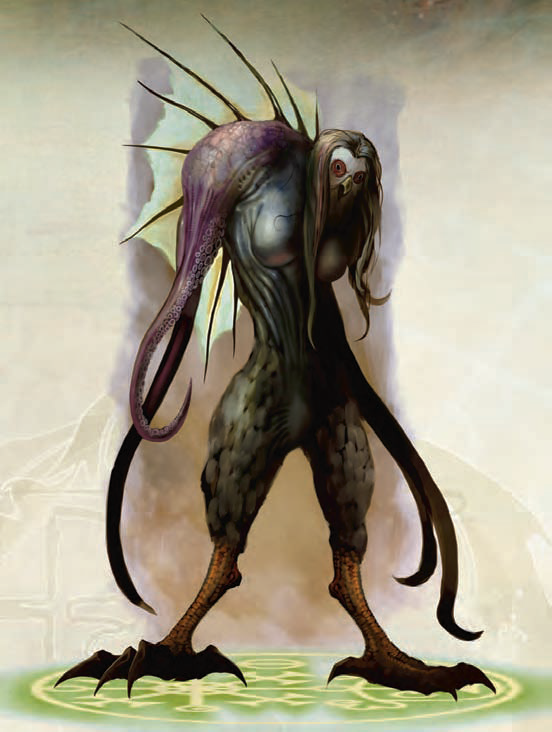
Yes, she has lamprey mouths for eyes.
Sign: Your skin becomes clammy and you leave moist prints on everything you touch, even if clothing blocks direct contact. These marks fade after a minute.
Abilities: Animals are automatically friendly to you, you gain DR 2/Lawful, your blood turns to poison which inflicts damage upon anyone who bites or swallows you, and you can walk on any liquid. Also you summon/wield a large magic warhammer. It starts a +1 but eventually turns into a +3 anarchic adamantine warhammer. Did I mention that you can wield this large hammer one handed regardless of your size?
Opinion: The hammer's the real takeaway here. The damage reduction is minor and doesn't scale, the poison blood, animal friend, and water walking are all situational, so how worthwhile she is to you is how much use you're going to get on the mace.
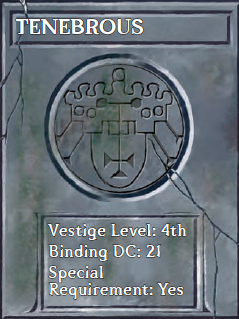
The Shadow that Was
Legend: Those familiar with First and Second edition AD&D might remember a storyline where Orcus was killed and rose again as Tenebrous, gaunt god of the undead. Orcus was pleased that he found divinity but he was angry that he rose as Tenebrous, rather than achieving Divinity as Orcus. He traveled the planes, slaying other gods to steal their power, some say his plan was thwarted by a band of mortals but either way he rose again as Orcus, but not as a god.
True divinity, however, cannot be destroyed. Less than a god, but still divine, the remains of Tenebrous drifted the planes until it coalesced into a bitter sentience, a shadow of a shadow.
Special Requirement: You must draw Tenebrous' seal at night or in an area of deep shadow with little to no daylight exposure.
Manifestation: The summoner's shadow shifts to fall across the seal. Even in complete darkness the shadow is darker... which isn't how complete darkness works. Once the shadow crosses the seal an inky humanoid form - impossibly gaunt, holding it's limbs at disjointed angles - rises from it. Tenebrous' voice is a whisper on the wind, almost impossible to hear yet laden with meaning.
Sign: You always seem to be standing in shadow even in brightest day. Furthermore your own shadow never seems to extend more than a few feet from your body even if the ambient light suggests it should be longer.
Influence: You are filled with a sense of detachment and loss. You must never be the first to act in combat, if your initiative result is the highest you have to delay until someone else takes a turn.
Abilities: You can cast deeper darkness on yourself with unlimited duration, and you can change the radius up or down by 10 foot increments as long as it doesn't exceed the size of the spell, you can also see in darkness of any kind (even your own), charge your attacks with cold energy, Turn and Rebuke Undead, and cast the Flicker mystery between 1 and 3 times a day... which is described in the shadow magic chapter. Basically you can dimension door 5 feet/2 levels as an immediate action once per round for level/rounds. But since it's an immediate action you can do it in response to getting hit by an attack and give it a 50% miss chance.
Opinion: Besides the fact that you are essentially invisible to 60% of all enemies? Let me reiterate. Turn or Rebuke Undead as a cleric of your level, with unlimited uses per day and a five round cooldown. This can power divine feats, one of which almost makes Buer redundant. Or if you just want to smash face in or breath fire there are divine feats for that too. Tenebrous is ridiculous.
Level 5 Vestiges
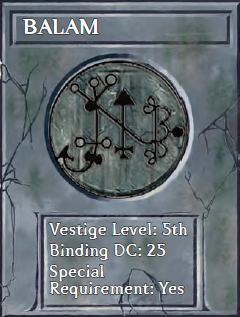
The Bitter Angel
Legend: Binder scholars claim that Balam is all that remains of the soul of a powerful solar. Exactly how she came to exist in her current state remains a mystery, but sources of planar lore state that several good gods tasked her with eliminating the practice of sacrificing sentient beings in the worship of dieties. Since such sacrifices are part and parcel of evil rituals, the task amounted to wiping out the worship of evil gods altogether - a task beyond what even good deities can accomplish. Needless to say, she failed, and some claim that her foes actually sacrificed her in praise of their dark god.
Special Requirement: You must deal 1 point of damage to yourself or another sentient creature with a slashing weapon, and drip the blood within Balam's completed seal.
Manifestation: Balam is a terror to behold. Her body is that of a great purple serpent, and her head consists of the top halves of 3 horned humanoid heads arranged evenly around a shared gaping maw. The mouth is a tooth studded chute that extends deep into her body and her six horns point forward around it. Balam speaks in a grinding moan, exhaling hot stinking breath with each word. The fangs in her chute-mouth move in waves with the shuddering of her throat and the eyes of her three heads glow blue when she becomes excited or angry.
Sign: Your voice becomes hollow and guttural.
Influence: You distrust Paladins, Clerics, and other devotees of deities. Whenever you enter a temple or some other holy site you must spit on the floor or otherwise invect against the place.
Abilities: You can reroll one d20 roll every 5 rounds, you gain a gaze attack that deals cold damage, you gain a +1/4 levels insight bonus on initiative, reflex, and AC. And the Weapon Finesse feat.
Opinion: The Gaze Attack is.. okay but it's not party friendly, meaning you're dealing 2d6 damage to everyone who can see you all the time. The d20 reroll and the insight bonus aren't quite as good in that context.
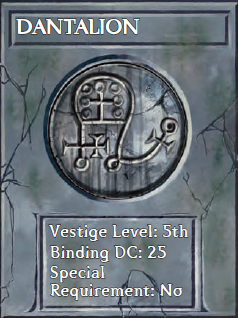
The Star Emperor
Legend: Binders know little of how Dantalion came to be. The most common legend is that he is not one man but the conglomeration of all the souls of an royal line whose members were cursed not to join their deities in the afterlife. This ancient imperial line is not now connected to any living leaders. Supposedly however, descendants of this family still live, ignorant of both their heritage and curse. Some binders profess to be scions of Dantalion - the true heirs of the royal line - but these claims are likely just the fancies of romantic minds.
Manifestation: Dantalion appears in a flash of red light as a 10-foot-tall humanoid, resplendent in crimson and gold robes. His head is a massive conglomoration of dozens of human faces - male and female, young and old. A gold crown as big around as a barrel rests on the brow of his enormous cranium. Dantalion carries a great tome under one arm and speaks with the voices of his many faces, always in cryptic passages that he reads from his tome, but the speaking face changes often and usually in mid sentence. Those who glance at the book's pages see a dark sky filled with stars that change with the flip of a page.
Sign: One of Dantalion's faces appears on your torso, as though it were a vestigial conjoined twin. It seems lifeless most of the time but when you activate an ability granted by Dantalion it opens its eyes and mouth, revealing a starry void within.
Influence: You are aloof and use stately gestures. Dantalion also can't help but be curious about the leaders of the day. Anytime you are within range of someone who clearly is (or professes to be) a leader of others, Dantalion requires that you try to read that person's thoughts. Success or failure you only need to try once.
Granted Abilities: Obviously, you can read thoughts, you can also force enemies to not attack you for one round, you gain a +8 bonus on all knowledge checks, and you can teleport 5 feet/level to anywhere you can see.
Opinion: Thought reading is powerful, but it can also cause problems. The ability to teleport and prevent attacks is pretty good though.
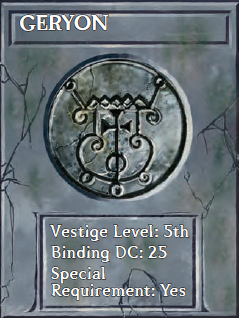
The Deposed Lord
Legend: Geryon was one of the nine lords of hell. He supported Asmodeous against his rivals during the upheaval in Baator. When the armies of the opposing lords met to decide who would take Asmodeus' power, Geryon blew his horn. At his signal the armies turned against their leaders, and the usurpers were thrown down. Knowing that he had taught the usurpers a lesson they would not soon forget, Asmodeus returned them to power. Rather than reward Geryon, however, he inexplicably gave his lone supporters power to another.
His fate after this is unclear, but some binder scholars think that Asmodeus had one more betrayal in store for him. Bewildered and stun, Geryon lost all hope for the future. He began to question the purpose of his actions and in a moment of weakness the point of his own existance. It was then that Asmodeus struck. The ruler of the Nine Hells had always hungered for the souls of those that had lost their faith, and Geryon made a fine meal.
Special Requirement: You must have at least 5 ranks in Know(religion) or Know(nature) to summon him as you have to have at least cursory knowledge of souls and their place in the planes.
Manifestation: Geryon appears in a flash of sickly green light. A strange conglomoration of forms, his body resembles three ogre mages standing with their backs to each other and melded into one being. He has three legs, each with two feet, and three arms each with two hands. Three brutish faces gaze out from equidistant points on a single head, which sits upon a neck jutting out from three shoulders. One face is angry, another agitated with rolling eyes, the third seems thoughtful and stares off into space. He only speaks from one face at a time, and turns to face the binder with whichever face suits his mood at the time.
Sign: Two extra pairs of eyes with green lids and yellow catlike irises open on your head at eye level, equidistant. Your own eyes take on the same appearance.
Influence: You are overly trusting and loyal. If you use sense motive or any other means of determining truthfulness you count as rebelling against Geryon's influence.
Abilities: You gain a gaze attack that deals acid damage (This time you can choose to not affect allies), you can see all around you, you can see in darkness, and you can fly with a speed of 60 feet for one round. All of these abilities except the flight require you show his sign for obvious reasons.
Opinion: Being able to avoid affecting allies with a gaze attack is a good thing, but the Gaze attack is the only thing that's really good. Only being able to fly for one round out of five lets you cheat obstacles but is of limited use in combat.
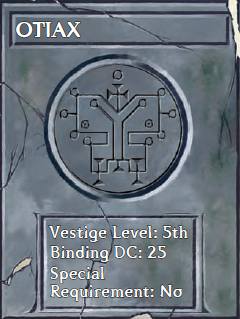
The Key to the Gate
Legend: Otiax appears to have come from outside of reality in the Far Realm. But there is no real explanation for his past. Otiax never speaks so it can shed no light on it's own origins, binding it is more a matter of instinct and will than deliberation.
Manifestation: A locked golden gate appears in the seal. Blue fog curls out in wispy tendrils from between the bars, obscuring what lies beyond. After a moment of silence, some unseen force crashes against the barrier. Then the gate shakes and rattles loudly as though some creature is desperate to open it. Ragged breathing becomes audible, and the fog swirls around some indistinct yet terrible form. At last the raging stops, and the azure vapor passes through the gate, the tumblers turn and the gate creaks open.
Sign: While bound to Otiax, you are surrounded by thin wisps of light blue fog even in the strongest wind.
Influence: When confronted with unopened doors or gates you become nervous and agitated until it is opened or until you can no longer see it. Also: If you find a key and know where the lock it is paired to is, you must use it.
Abilities: You can open anything that an open/close spell could, but not close it. You can unlock anything with a DC equal to or less than twice your binder level as your 5 round. If you're showing Otiax's sign, you can use it to make air-blast touch attacks as if they were melee weapon attacks, i.e. as many as your full attack action would get you, it is a reach weapon but you don't get your strength bonus to it. You also get the Combat Reflexes feat and a 20% miss chance.
Opinion: Otiax is one of the better 'melee' vestiges. The air blast doesn't deal much damage but since it's a touch attack you're basically guaranteed to hit, combat reflexes and a 10 foot reach also means that anyone who moves near you is in for some hurt. The Unlock ability lets you pretend you're a rogue at least in part, all in all a good vestige.
Level 6 Vestiges
You get the ability to have 3 vestiges bound at once in this batch of vestiges, so keep that in mind.
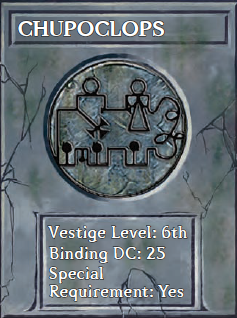
Harbinger of Forever
Legend: Chupoclops once stood tall in the company of Fenris, Dendar the Night Serpent, and other supposed harbingers of the end of existence. A Titanic spiderlike creature, Chupoclops stalked the Ethereal Plane, devouring ghosts and giving birth to nightmares. Legend has it that the gods trapped Chupoclops in the Ethereal to prevent him from devouring hope, but it was destined to escape and sate its hunger during the end times.
Because it was a terror to both the living and the undead, several powerful individuals eventually joined forces to fight it. Three were great heroes, and four were powerful villains. One of the heroes and three of the villains also happened to be ghosts. They set out to murder Chupoclops and do what the gods could not. The furious battle lasted for seven days and each day ended with the death of one member of the group. On the last day the last hero struck down Chupoclops with their dying blow.
Not being defined by the normal rules of the universe, Chupoclops became a vestige after it's death. It's enormous corpse still rests somewhere in the Ethereal Plane and now that it is dead it can no longer destroy hope. And since hope will always exist so will the world.
Special Requirement: You must draw Chupoclops' seal with a handful of grave soil, or place the dead body of a sentient creature over the seal. At this point the game is just screaming at you "have you taken the ignore special requirements feat yet?"
Manifestation: Chupoclops is a colossal phase spider but only the part directly over the seal is visible at any given time. In most cases it appears first with a giant spider leg striking the seal out of nowhere, then it slowly brings it's face into view and down to the level of its summoner. Glaring over its odly tusked face with eight all too human eyes.
Sign: Your lower jaw increases in size, and two long sharply pointed tusks grow upward from it.
Influence: You can't help but be pessimistic. At best you're resigned to your own failure, at worst your doubts spread to others, trying to convince them of the hopelessness of their goals. In addition, you must voluntarily fail all saving throws against fear effects or effects that impose a morale penalty.
Abilities: Everyone within 10 feet of you takes a -2 penalty on attack rolls, checks, saves, and damage rolls. You can also become ethereal at will and remain there indefinitely... as long as you don't take any actions. You return immediately after taking anything as complex as a move action or greater. Once you have returned to the material plane you can't do it again for 5 rounds. You gain ghost touch with all melee attacks, the Pounce ability, and a natural bite attack.. You also gain the ability to sense all living creatures within 10 feet as if you had blindsense and cast deathwatch.
Opinion: Pounce is pretty great, and an extra attack to use it with is good. Ethereal jaunt and ghost touch are situational at best, as is the deathsight thing. And the -2 penalty aura is a double edged sword, it affects everyone regardless of their affiliation.
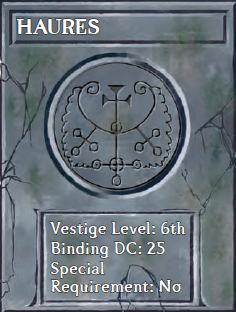
The Dreaming Duke
Legend: Human history associates Haures with a powerful lord who terrorized his people. From the time he took the throne until his death, he kept his subjects at work building his castle, adding constantly to its grandeur and might. Workers at the castle would return with strange tales of building a room and then rebuilding it the next day because no sign remained of their previous day's work. Then those who told such stories began to vanish in the castle, never to be heard from again. Although the castle grew with the additions made to it for the first few years, the constant construction seemed to have no effect on its size in later years. When at last Haures died, his subjects rejoiced and attacked the castle, hoping to loot and set fire to the palatial structure. The mob of peasants found the castle empty, devoid even of its furnishings. Confused and frightened, they left, and the castle and the surrounding lands soon gained a reputation for being haunted.
Binder scholars believe they know the answer to the mystery of Haures’s disappearance and the strange construction of the castle. According to their legends, Haures was not a human at all, but a powerful rakshasa sorcerer in disguise. Much of the construction he demanded took place on the Ethereal Plane because Haures planned to continue his existence there as a ghost. He wanted his afterlife to be as much like his mortal life as possible, so he had his subjects build a nearly exact duplicate of his castle on the Ethereal Plane and cloaked their work sites in illusions to hide the truth. In the last months of his life, Haures brought many living and undead servants to his foggy realm, as well as all the comforts to which he had become accustomed.
For some time after his demise, Haures spent time on both the Material and Ethereal Planes. As a ghost, he would cloak the decaying castle on the Material Plane in bright illusions so that he could throw lavish parties for the travelers attracted to its warm glow. Then he would end the party suddenly, leaving his guests alone in the chilly ruins of his castle and delighting in their terror. As the years passed, fewer folk dared enter his home, and Haures began to throw illusory parties for himself to alleviate his boredom. As his sanity deteriorated, he became unable to distinguish between the Material and the Ethereal Planes, and even between his illusions and his own imagined experiences. At some point, Haures lost all sense of the difference between reality and dreams, illusion and imagination, and even life and undeath. This complete dissolution of these barriers propelled him into existence as a vestige.
Manifestation: First a ghostly tiger stalks out of thin air, but its appearance rapidly changes to that of a handsome well dressed middle-aged man. A moment later he decays before his summoner's eyes, rotting into a zombielike state, then fading into ghostly incorporeality and changing again into a skeletal tiger wearing a shining crown and purple robe. The crown falls away and regains flesh to begin the cycle again. Haures is only cognizent of his summoner while in his living human form and speaks only in those brief moments.
Sign: While bound to haures you get backwards Rakshasa hands.
Influence: You are eccentric, often speaking to yourself or your imaginary friends. In addition if you encounter and disbelieve an illusion you must not voluntarily enter its area.
Abilities You are continually affected by a mind blank spell, become incorporeal while moving (and gaining a 50% miss chance on opportunity attacks), can cast Major Image as a five round, and Phantasmal Killer as a five round.
Opinion: You can cast Phantasmal Killer as a supernatural ability, meaning it's not a 4th level spell, it's a level/2 level save or die. Who cares if it's a 5/round thing that's pretty damned powerful. Ethereal movement is pretty okay and being able to pull Major Images out of your ass isn't bad either.
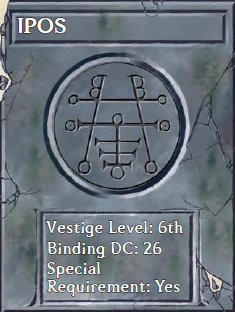
Prince of Fools
Legend: A mortal scholar of deities and the planes, Ipos discovered vestiges and the process of binding long before their rediscovery in the current age. Although binder lore conflicts on his race and nation of origin, he was obviously a mighty spellcaster with the power to travel the planes in his pursuit of knowledge.
Although he was interested in all subjects, he had a particular passion for discovering the nature of the planes, magic, and gods. Through his study of these topics he sought to discover the fundamental order of reality.
He did a magnificent job with his research, and his discoveries have been passed down the generations. Yet he left such an incomplete vision of reality that later scholars and explorers had to expand upon his body of work. In the midst of his investigations, he stumbled upon Vestiges and drowned in the depth of this knowledge. He could not conceive of beings that did not exist in a place he could access, and become obsessed with finding where the Vestiges reside. What happened next is a mystery but considering he's now a vestige himself he obviously succeeded.
Special Requirement: You must have 5 ranks in Know(arcana) and either Know(religion) or Know(planes).
Manifestation: Ipos steps out onto the seal as if appearing from invisibility. His head is that of a bald ibis. Atop his scalp he wears a crown of black iron, and a many-layered gray cloak hides most of his form. His overly long arms end in gray furred lions paws. In one paw he holds a gnarled iron cane that he uses to strike the ground for emphasis rather than as a walking aid. He keeps the other paw hidden in his sleeves but from time to time you can see him extending his long black claws. Despite his rusting crown and tattered cloak he presents an imposing figure, to which is hissing voice and baleful glare add considerably.
Sign: You grow long, black, clawlike nails.
Influence: You think highly of your intellect and show contempt towards those who question your assumptions or conclusions. If you encounter a creature that expresses interest in a topic of which you have knowledge, Ipos requires you truthfully edify that individual.
Abilities: You gain cold iron claw attacks and can rend, can gain a true seeing effect for 1 round as a swift action every 5 rounds, you are immune to the harmful effects of any plane you are on, and increase the dc of your binder abilities by 1, and your effective binder level for gaining abilities by 1 for all vestiges you are bound to.
Opinion: The DC/Level increase is good but not fantastic, the planar attunement is situational but valuable when necessary, but the claws actually deal more damage than normal for your size which means the rend does a lot of damage as well. Meaning if you're only binding another vestige for the melee attack it grants he might be a decent replacement.
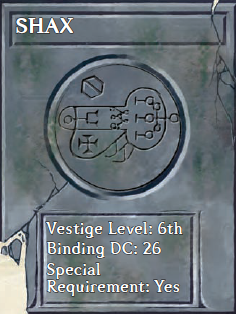
Sea Sister
Legend: Shax once ruled over storm giants as a goddess of the sea. She was born to Annam, the greatest of all giant gods without his knowledge. Because he was prone to blind spots in his omniscience, Annam could not hear the giant's prayers when they mentioned Shax, nor could he see her many cruelties towards them. He realized that some problem might exist only whent he storm giants started battling the other giant kinds and stealing their homes as giant territory. When he asked the storm giants what was wrong they pointed to the sea, unable to tell what was wrong he sent his son Thrym to take care of the problem.
Thrym, god of frost giants, was eager to stop the incursions into his follower's lands, so he picked up his axe and leapt into the sea. There he met his sister Shax for the first time. He found her both beautiful and terrible and offered to marry her if she would call the storm giants to return to the sea. Shax would have none of it so the two fought.
In the end Thrym won, beheading Shax with a clean blow of his axe, but not before she scratched off some pieces of his flesh with her nails. The strength of her spirit gave her the power to resist the pull of the Astral Plane, so she became a vestige. As for Thrym, he yet lives but the pieces of his body that his sister removed still exist as icebergs as a constant reminder of the storm giant's debt to him.
Special Requirement: You must draw Shax's seal within sight of a pond, stream, or larger body of water. HAVE YOU TAKEN IGNORE REQUIREMENTS YET!?
Manifestation: A semitransparent female storm giant looks down smiling at her summoner, then she keeps looking down as her head tumbles off her shoulder. The body disappears as the head becomes more solid, landing with a wet thud. Then the wet black hair coalesces into tendrils that press against the earth, lifting her up and turning her around to face her summoner. She glares balefully with yellow eyes and with a shrill voice demands to know who summoned her.
Sign: A scar appears around your neck as if your head had been lopped off and returned to your body to heal.
Influence: You become possessive and stingy, particularly about territory - be it actual territory or just a room at the inn. In addition you are required to demand compensation for any service rendered and to tax the use of your territory. But you can accept nearly any item of value - be it material goods or a service - as payment.
Granted Abilities: You can use Freedom of movement for 1 round every 5, charge a single attack with electricity and sonic damage, are immune to electricity, and gain a swim speed.
Options: The storm strike only lasts for one attack and requires a swift action, you can do it every round but that eats up your swift action. The swim speed is situational and the freedom of movement ability is kind of defined by the fact that it lasts longer than a single round. All in all it's not that great a vestige for something you get at level 12.
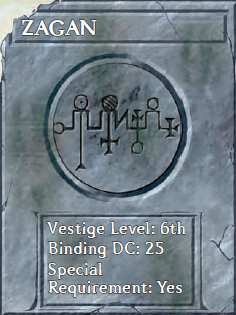
Duke of Disappointment
Legend: When dwarves had yet to tunnel into their mountains and elves first walked beneath he boughs of trees, Zagan ruled over thousands. A lord in a great yuan-ti empire, he had power over hundreds of his own kind, who in turn controlled the lives of thousands of humanoid slaves. Zagan built himself up as a god to these slaves, using the yuan-ti as his emissaries to communicate with the uneducated masses over which he held sway.
Over time, Zagan’s power became so great that he actually aspired to become a god. He sought and finally discovered the means to his goal: a grand ceremony wherein he and his yuan-ti would gather together all his worshipers and slay them. At the appointed hour on the appointed night, Zagan collected all his people for a celebration of his glory. He could feel their worship empowering him, and with each passing minute he gained strength and felt his awareness widening.
Then Zagan rang the gong that signaled the attack, and he and his yuan-ti servants fell upon the slaves, slaying them with wild abandon. At first Zagan thought it glorious, but then he felt his new powers begin to wane. With each life he crushed, he felt a bit more mortal.
Zagan attempted to call off the ceremony, but in the chaos of the slaughter, the other yuan-ti could not hear him. Suddenly, a sword pierced Zagan’s chest from behind. As he looked down at the bloody blade, a sibilant voice whispered in his ear, “The World Serpent wishes you well.” A cleric among his own people had tricked Zagan into ruining his chances at godhood on the very eve of his apotheosis. At a point somewhere between godhood and mortality, Zagan passed on into the void.
Special Requirement: You must kowtow before Zagan's seal and address him as a diety.
Manifestation: When he begins to manifest, several snakes appear in a heap upon his seal. They then slither apart and rise upright along the lines of the seal. Then the crown of a head appears, with baleful eyes glowering. An ogrelike head slowly reveals itself followed by shoulders and arms to which the snakes are attached. He uses his powerful arms to pull the rest of his body from the ground, revealing a powerful serpentine body instead of legs. He reaches forward towards the summoner hungrily but the snakes on his body hiss and drive him back. He then broodily addresses his summoner while calming the snakes. Binder scholars claim that the snakes attached to his body are his most loyal subjects bound to him in death.
Sign: You gain a lisp. What did you think would happen?
Influence: You are domineering and aggressive, and you must slay any snake or snakelike being that you meet, and deface any artwork depicting anything snakelike that isn't Zagan.
Abilities: You can create an aversion affect in a single target, requiring them to stay 20 feet away from you or any snakelike creature, or take a massive penalty to dexterity if they can't. You also gain the scent ability, improved grapple, and constrict. As well as the Bane ability vs snakes with all your attacks.
Opinion: There's an okay combo with Zagan and Ipos, creating an aversion in someone then grappling them with your claws, rending and constricting them every round. But the rest of his stuff is too situational.
Level 7 Vestiges
After Zagan and Shax I think they were feeling bad and decided to give you two good Vestiges.
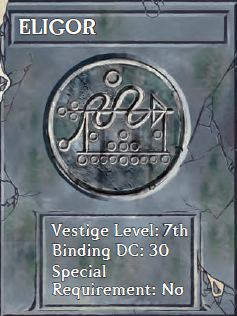
Dragon's Slayer
Legend: Eligor was a great half-elf dragonslayer before his death at the hands of the minions of Tiamat. After his death Tiamat sent her minions against the followers of both the human and elven deities demanding that they release his soul to her. Despite his great service to both races they gave up his soul to stave off the attacks against their living followers.
Only one deity argued against the profound injustice. The race and gender of this lone voice of reason differs with the teller, and not even binder scholars agree on whether it was human or elf, or even male and female. In any case it set off alone to face Tiamat and wrest Elegor's soul from her grasp. Upon arrival the deity found Eligor in the service of Tiamat rather than in bondage. She had raised him from the death and used his abandonment by the other gods to win his service. Eligor and the deity fought, and the deity won. This time no god was willing to lay claim to his soul and he fell into the existence of a vestige.
Manifestation: Eligor clatters out of nothingness on a half-horse/half-dragon monstrosity. Both mount and rider are heavily armored and Eligor is completely obscured. He carries a lance in one hand and a banner in the other, each manifestation the banner and color of the mount cycle between the five chromatic dragon colors. Although he rides what is probably an evil creature he greets his summoner with warmth and respect.
Sign: One of your hands becomes scaled the color of the horsedragon.
Influence: You feel pity for all outcasts, particularly half-orc and half-elves. You must also seek out vengeance in Eligor's name and attack a human, elf, or dragon foe in preference to all others.
Abilities: As a free action you can charge an attack with elemental energy, you gain a +4 bonus to strength, the ride by attack and spirited charge feats, heavy armor proficiency, and a sizable bonus to natural armor.
Opinion: Eligor is the capstone to a melee build, you get a flat +1d6 to all of your attacks, +4 to strength, and heavy armor and natural armor make you incredibly hard to hit.
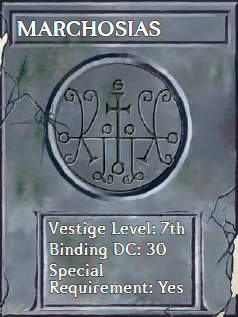
King of Killers
Legend: Marchosias was a human who brought death to others. His favorite targets were other assassins and murderers, but his choice of foes had nothing to do with morals. Despicably evil, Marchosias was obsessed with improving his skill as a killer and destroying other professional slayers seemed his ultimate challenge.
When at last he met his end he found himself in the nine hells. The devils gleefully accepted his powerful spirit but others took note of his arrival and were not pleased. The spirits of hundreds of thugs, slaughterers, executioners, and assassins banded together and revolted. The devils were loathe to accept such lawlessness but they allowed it, intending to punish them later after the fighting had ended. But once the smoke cleared Marchosias' soul had been torn to pieces by the hundreds of foes he fought.
Special Requirement: You must have done a evil act at some point in your past and not apologized, atoned, or made reparations. Lying or breaking a confidence don't count, but theft, infidelity, or vandalism do.
Manifestation: With a bloodcurdling scream and a plume of black smoke, Malchosias appears.
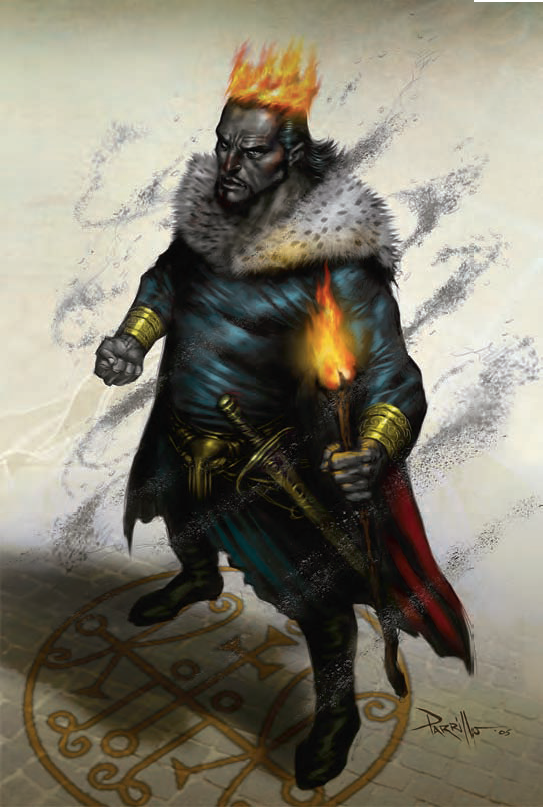
Sign: Your pupils burn with red-orange light. Anyone looking at your face can make a DC12 spot check to notice the effect. It doesn't provide any light but it's disturbing to look upon.
Influence: You are debonair and sly, as though you have some trick up your sleeve and are just waiting to use it. In addition if you catch a foe unawares Malchosias requires that you use your death attack.
Granted Ability: You gain the Assassin's death strike ability, you deal bonus damage to those who have access to sneak attack, skirmish, sudden strike, or any similar precision damage ability, you can turn into smoke ala gaseous form (and can study your opponent while in this form), and gain a whopping +16 bonus to hide and move silently checks.
Opinion: Published monsters don't normally have precision damage abilities so you probably won't get much use out of that, but the death attack is nice, the sneaking bonus is amazing is you need it, and the fact that you can study in smoke form is a nice plus.
Level 8 Vestiges
We... don't end very strongly, but at least you can bind 4 vestiges at level 20, right?
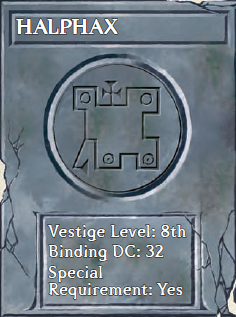
The Angel in the Angle
Legend: Halphax was a gnome engineer of inestimable excellence. He influenced elf, gnome, dwarf, human, halfling, every kind of building. His greatest passion was the architecture of defense. Unfortunately for him his professionalism became his downfall.
In Halphax's time gnomes were as populous as humans, and lived in grand cities that rivaled the elves. And all races were welcome in the gnome city states. The hobgoblins were the first of the goblinoids to rise out of tribalism and they found welcome in gnome territory. They quickly took to gnome society, learning as much as they could and using their strong backs and hale bodies to earn places for themselves in the military and manual labor trades. Then in an act known as the great betrayal, the hobgoblins turned against their benefactors. The victorious goblinoids turned each gnome city into a prison, using the fortifications meant to keep enemies out to trap the gnomes within. To ensure they overlooked no means of escape they captured and enslaved the gnomes that designed them, through a combination of threats and rewards, they forced the gnomes to make these prisons even more effective.
Many gnome architects chose to die rather than help the hobgoblins, others secretly used their positions to help their kinfolk escape. But when Halfax's wife was threatened, the great architect put all his effort into creating the most impregnable prison possible. Legend holds that no gnome ever escaped from the prison and it was the last goblinoid holding to fall in the war that followed.
When at last the hobgoblins were defeated, the prison city that Halphax had built was found empty of all gnomes but him. The hobgoblins had killed them all except Halphax and his wife. She could not bear to be the cause of so much tragedy so she took her own life. When the gnomes attempted to apprehend Halphax and hold him responsible for his deeds, the architect vanished into his city. The allied armies tore down the city to its foundations in their attempt to find him, but he was never seen again.
Special Requirement: Halphax's sign must be drawn inside a building in the corner of a structure.
Manifestation: The corner appears to warp, growing deeper and extending into an infinite hallway. In that distance a figure appears and then the distance closes, bringing Halphax into the seal. He is in the form of a gnome wearing leather breeches and a vest, both of whicha re covered in pockets and loops for holding tools and items. The tools of an engineer hang from his belt and he usually appears in a posture of boredom, hands in his pockets. The most striking feature of Halphax is that he is no longer made of flesh and bone, but of broken bits of stone and masonry. The shattered features of bas reliefs and gargoyles make up his face.
Sign: Your skin takes on the appearance of cracked stone.
Influence: In his time as a vestige, Halphax has lost all memory of his life and any sense of guilt for his actions. Thus when you are under his influence you lose any normal sense of shame or embarrassment. But if someone threatens a hostage you care about you must accede to their demands.
Abilities: You gain damage reduction 10/adamantine as long as you show his sign, a +16 bonus to know(architecture/engineering) and Profession(siege Engineer) checks, the ability to cast the imprisonment spell at will (but only imprison one enemy at a time and a max duration of your binder level), cast Leomund's Secure Shelter as a 5 round, and Wall of Iron as a 5 round.
Opinion: The Imprisonment removes an enemy from the battle temporarily but you aren't killing them, and the secure shelter is just sort of okay for setting up a place to stay for the night or a defensible position. Other than the damage reduction the only real combat ability you gain is a wall that your stronger allies can push over onto someone. Ultimately it's situational at best.
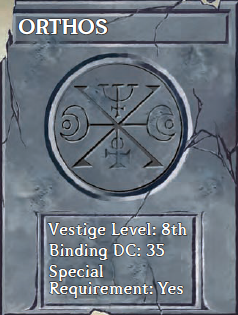
Sovereign of the Howling Dark
Legend: Orthos is probably the original vestige, as all pact magic texts mention this entity, and persistent explorers can find his seal in many places. Binder scholars have a thousand stories about his origins. All agree that he is inestimably old and it has long since shed any form and persona it might once have had, becoming an alien and distant being. In deference to it's great age and the hallmark of it's appearance, scholars gave him his title.
Special Requirement: You must summon Orthos in an area of bright illumination.
Manifestation: a breeze seems to pass over the summoner, but it ruffles nothing except your hair and clothes. The breeze intensifies becoming a cold wind, and a low whistle emanates from the vicinity of Orthos' seal. Directly over it appears a black spec - a mote of shadow like a blind spot in the observer's vision. The whistle becomes a moan that slowly rises in pitch and volume, eventually transforming into a howl as the darkness spirals outward, opening like the pupil of some giant cat's eye with an explosive gust of wind. The howling grows so loud that it pains the ear while the seemingly nonexistent wind buffets the summoner. Then it stops. In the sudden silence an unseen, unheard, yet palpable presence slides out of the black aperture and hovers heavily over the seal. Though not detectable by any sense, Orthos is eerily extant, and its presence can be felt by even the dumbest of beasts. The vestige says nothing; its summoner can only plead her case and hope that Orthos does not impose its influence.
Sign: You always seem to be buffeted by an unseen wind that changes directions at arandom.
Influence: You are averse to dark areas and loud noises. Although you can endure such conditions they make you panicky. Orthos also requires that you carry a light source with you at all times, and that you do not allow it to become darkened for more than 1 round. You must also only speak in a whisper.
Abilities: You gain Blindsight 30, displacement, a 5 round 60 foot cone of scouring wind that deals a good deal of damage, and the ability to cast Whispering Wind at will.
Opinion: Orthos is also primarily defensive but in a different way than Halphax. The wind breath is the strongest single ability you can get access to as a binder but only as a 5 round. It's okay but you have a lot of good options across the various vestiges so it's hard to pick.
And that's all of them. Finally. It's ultimately very customizable but there are a few stand outs that reward specialization. Like Tenebrous and Eligor, but others are ridiculously situational.
Up next: Binder Prestige Classes
Binding Feats, Prestige Classes, and Items
Original SA post
Binding Feats, Prestige Classes, and Items
Well it's been a while, so let's hammer out 3 bits of Binder stuff at once.
Pact Magic Feats
Bind Vestige: So you want to bind a vestige but can't afford the one level dip into binder to do so? This is the feat for you.. sort of. You can only bind level 1 vestiges, you only get one ability from them, and you can't suppress their sign even on a good pact. Not that you're likely to make a good pact as a level 1 binder. They're not even really good abilities either. Ronove gives you feather fall, Amon gives you darkvision, Aym gives you the ignore-hardness while sundering thing, Naberius gives you his skill-training thing. Ultimately this isn't that great a feat.
-Improved Bind Vestige: You're now a 5th level binder which gives you access to 3rd level vestiges, but you still only get one ability from them. the only real stand out is Savnok's call armor.... except you're only summoning the level 5 version of the armor.
-Practiced Binder: You get a second ability but they're still not that great, e.g. you get amon's ram attack.
Empower/Widen/Enlarge/Extend Supernatural Ability: You can sorta metamagic a supernatural ability once per day per one of these feats you take, the one godsend of these is that it's based on your hit dice as opposed to the relative level of the power, so there's nothing stopping you from empowering the level 20 whirlwind breath.
Sudden Ability Focus: You can get a +2 bonus to the DC of a single ability use once per day... hooray?
Expel Vestige: You can attempt to expel a vestige before your 24 hours is up. To do so you have to summon the vestige again and succeed on another binding check. If you do it's expelled but you take a -10 penalty on your next binding check and on the check to bind the vestige you expelled hte next time you do so.
-Rapid Pact Making: Once per day you can bind a vestige as a full round action without the penalty on the check.
Favored Vestige: Increase your binder level by 1 for a chosen vestige.
-Favored Vestige Focus: Increase the DC of your supernatural abilities from the vestige by 1.
-Rapid Recovery: The 5 round abilities from your Favored Vestige become 4 round abilities. Depending on what vestige you're favoring this could be anywhere from one ability to all four of them. Meaning you could do something every round.
Ignore Special Requirements: You can ignore the special requirements of the vestiges you bind.
Improved Binding: You gain access to vestiges 2 levels before you normally would. This might not seem like much, but imagine if there was a feat that let wizards gain access to N+1 level spells? Sure 10th level spells don't technically exist but you're gaining access to fireball at level 3.
Skilled Pact Making: You get a +4 bonus on binding checks.
Defense against the Supernatural: You get a +1 bonus on saving throws against supernatural abilities.
Supernatural Crusader: You get a +1 on attack rolls vs creatures capable of using supernatural abilities.
-Supernatural Opportunist: You know how the big thing about supernatural abilities is that they don't provoke attack of opportunity? Well if you take this feat they do.
Binding Prestige Classes
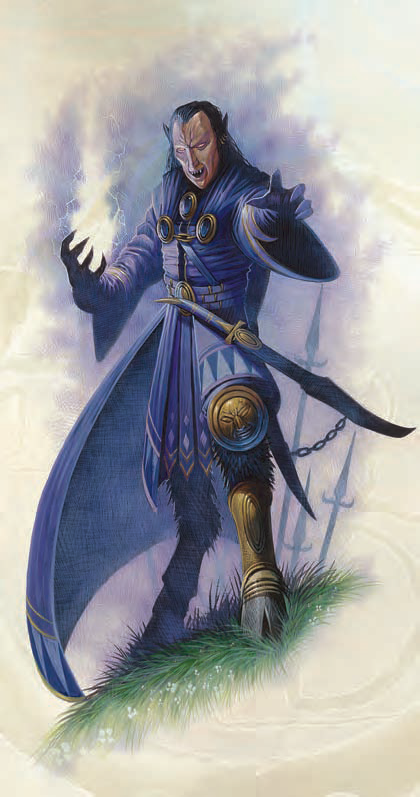
Anima Mage
“Those fools. They hunt innocents. It’s me they ought to fear!”
If you didn't get the hint, these guys are super evil, though they're only required to be 'non good'. They're also the requisite "Arcane caster + new thing" prestige class. The reason why they're evil is that they're essentially tricking the vestiges that they're binding. Rather than the normal experiences that a vestige longs for and expects to get out of the binding deal, they force them to devote their attention to other tasks. Even if they're extraplanar creatures it's still kind of cruel.
Their main class feature, Exploit Vestige if you take a -5 penalty on your binding check and still manage to make a good pact with the vestige you can give up one of their abilities to gain an extra spell slot of your highest level. If you fail to make a good pact then you still lose the ability as the vestige is kind of pissed at being exploited. Vestigial Awareness forces the vetsige to keep an eye out for danger and give you a +2 bonus to initiative checks. Vestige Metamagic Lets you give up all access to a vestige's abilities for 5 rounds in exchange for applying a metamagic feat to a spell for free without increasing it's casting time. and Vestige Casting , the capstone ability, lets you cast one of your spells as an immediate action once per day as if it were affected by the still and silent spell feats. They also have a new spell here called Vestigewrack which forces an incorporeal creature to be overcome with feelings of their lost corporeality, torturing them and giving them a major penalty on attacks and saves for as long as they're near you. It also gives you a +2 bonus on binding checks.
As far as the fluff is concerned, take every bad thing anyone's ever said about a binder and it's probably true about Anima Mages. They're hated even by other binders so they have to be twice as sneaky and twice as ruthless to survive.
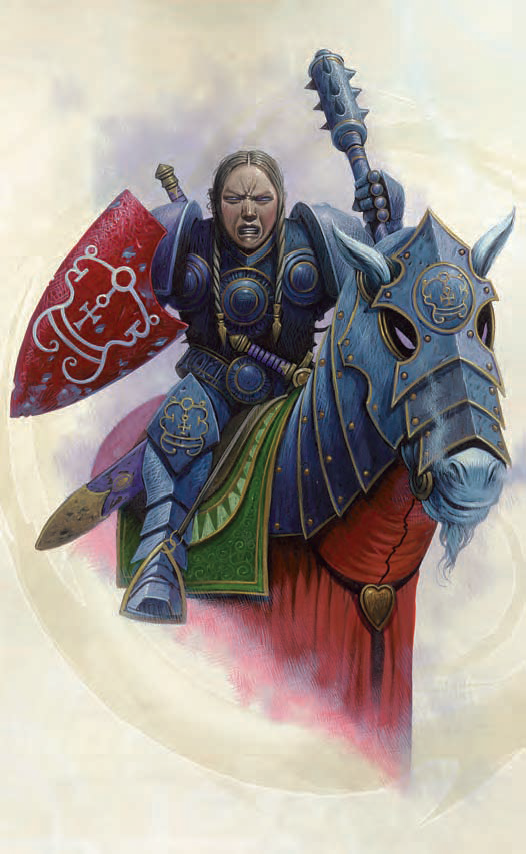
Knight of the Sacred Seal
“I serve Paimon, a prince among men who was martyred for love. Can you claim your cause to be so righteous?”
This is the requisite "Fighter + New Thing" class, and it's actually not that terrible, mostly because you don't strictly need to be a fighter to get into it, just have Weapon Focus and be non-chaotic. As a plus paladins can freely multiclass into it but as I've already pointed out the out-of-class-binding feats kind of suck.
First thing you have to do is pick a Patron Vestige , you class features cease to function if you don't bind them every day, but you are never at risk of making a poor pact with your patron. First of all you've got Aligned Strike which makes your weapon attacks match your alignment as much as it is possible to do. So you can get both lawful and good. If you're true neutral you can pick a single alignment (even chaotic). Second is Vestige's Protectoin which is a 5-round swift action to add your charisma bonus to your AC and reflex for one round. Followed by Vestige's Protection Aura which gives it to anyone adjacent to you that you qualify as a friend when you activate it. Vestige's Power lets you get +2 to str and con, +10 to land speed, and +4 to will for one round as a 5-round ability. Vestige's Surge lets you ignore the 5-round requirement of one of your patron vestige's abilities once per day, and finally Apothesis makes you a native outsider and gives you dr 10/magic.
In the fluff there's a quote from the dude who's the literal boogeyman of binders calling them "Just and honorable" and saying that it's a shame that they have to be killed. So they're kind of outliers as far as Binders are concerned. There are sometimes cadres of Knights that all bind the same vestige but those are rare. More often you may have a knight guarding a binder coven or something similar.
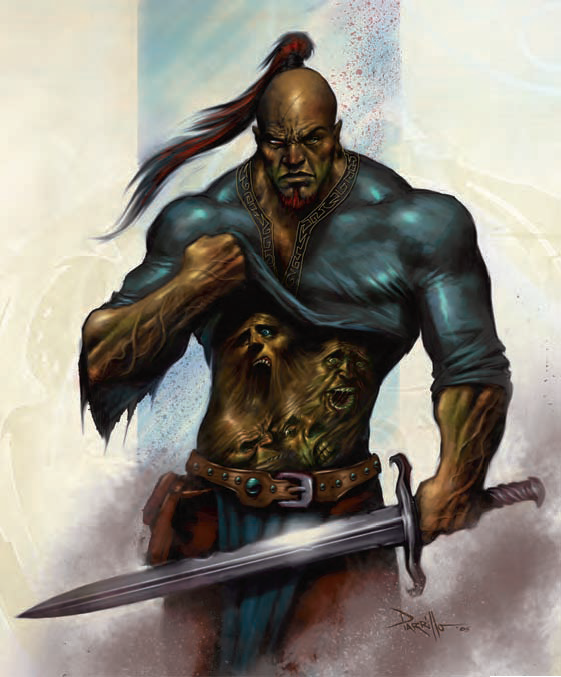
Scion of Dantalion
“The light of the Star Emperor guides me. His blood runs in my veins, and I am one of his princes.”
Not strictly evil but probably a massive toolbag none the less. Scions of Datalion believe that they're descended from the lost line of the Star Empire, and that it is their right and duty to bear the scepter of rulership and rebuild their empire. The toolbag part comes in when there's someone else already holding the scepter of rulership, cause they don't like that. It's restricted to anyone of human heritage that can bind Dantalion.
Favored of Dantalion lets you auto-succeed on binding checks with the big ball of faces, it also causes his sign to grow, giving you an extra face for every level in this class you take. Scholarship of Dantalion lets you reroll a single knowledge check once per day. Improved Read Thoughts gives you an extra 5-round ability that lets you skip the first two rounds of concentration on Read Thoughts to get a person's surface thoughts. Swift Awe of Dantalion lets you activate Awe of Dantalion as a swift action once every 5-rounds. Overwhelming thoughts lets you dacze someone who's thoughts you're reading by forcing your thoughts into their head. Dantalion's Glare lets you expose your sign and blind someone once every 5/rounds. The only problem is that you need to have your sign exposed, which means you need a hand free to pull up your shirt, or you need to spend an extra standard action to partially doff your armor (which provokes attacks of opportunity). Improved Thought Travel lets you do his brain teleport thing as a move action and Read Multiple Thoughts lets you read a number of people up to your charisma modifier simultaneously.
Soo, not exactly a very good class. Dantalion's a fairly social vestige and this prestige class doesn't give you much in the way of combat abilities beyond overwhelming thoughts. And Dantalion's glare actively hampers your abilities in combat. In the fluff they're basically all Machiavellian assholes who try to marry into royalty and then kill off the rest of the line of succession.
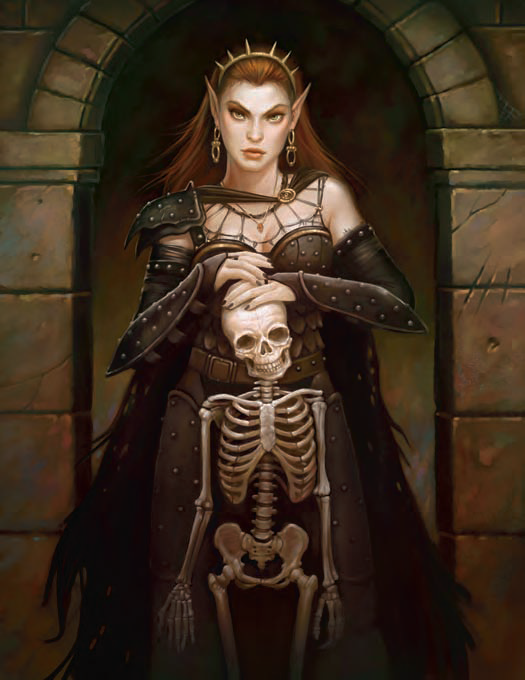
Tenebrous Apostate
“Rise again, Lord of the Outer Dark. Stand astride the barriers of life and death, of Heaven and Hell, and take up thy mantle as slayer—and king—of gods.”
We've had the Wizard + X and the Fighter + X classes, this is the Cleric + X class and it's a doozy. The requirements are super specific, Nongood, ability to bind Tenebrous, which is something you can't do with the feats. Must worship Tenebrous as a god, and must have access to an outside source of turn/rebuke undead attempts.
What do you get? Well first of all Eternal Bondage , which isn't as kinky as you might think. You can't choose not to bind Tenebrous, he is always stuck to your soul, though you can make a binding check to make a good pact on any single day. Next you get Tenebrous' Rebuke which transforms all your Turn attempts into 1d6 points of damage and rebuke attempts into 1d6 points of negative energy healing to every undead within 30 feet. Visage of the Dead causes you to get gaunt and shadowy, giving you a dodge bonus to AC and mindless undead refuse to attack you unless provoked or order to by their creators. Destroy/Empower Undead lets you spend 2 turn/rebuke attempts as a single standard action to do double the damage/healing, but also limiting it to mindless undead. Umbral Body lets you cast the umbral body mystery, sort of, the wording on the ability says once per day and also describes it as a 5-round. Finally Blast of the Void lets you spend a turn/rebuke attempt to deal 1d8 points of damage per turning level to every living creature in a 30 foot cone once per day.
So yeah, Tenebrous. The only real problem I can find with this class is that they have no way to create or command undead natively outside of their cleric levels.. but since you need 7 levels of binder to bind Tenebrous that will be rather anemic. So even though Tenebrous is as evil a god as they come (Chaos, death, evil and trickery domains) this seems like some kind of bizarro Pelorite class. For a 1 level dip into cleric you are now the absolute best at killing undead you chaotic-neutral thing you. In the fluff they're decidedly more evil and sinister since they're worshiping a god fragment of Orcus.
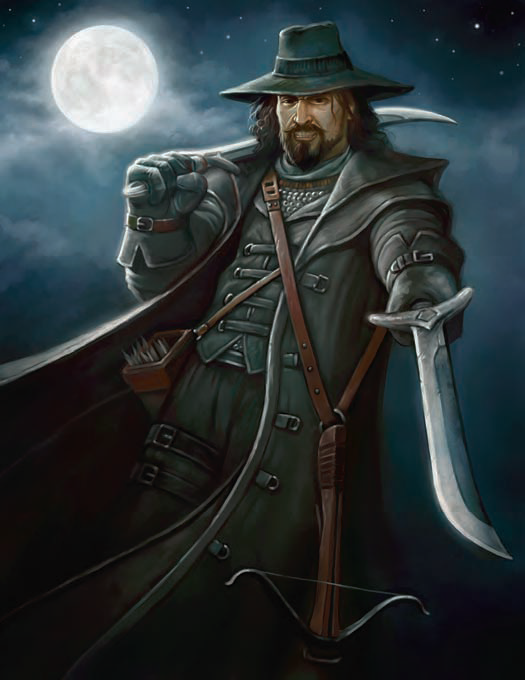
Witch Slayer
An insidious group, these binders. They are dangerous and unpredictable, and they pose a significant risk to the divine order.”
So of course there's a prestige class devoted exclusively to killing binders, which means this is probably an NPC class at best unless your DM has a hardon for binders and keeps using them as villains constantly. Probably the most surprising thing about the class is that it doesn't require those "Fuck supernatural caster" feats.
For abilities they get Smite Spirit Sharer 1/day/level, which also works on possessed people. Mettle , Locate Possession which is basically Detect Magic but only on possessed people/binders and only in a 60 foot cone. Slippery Mind , and Momentary Disjunction which gives you a 5-round ability to temporary disable all spellcasting, spell-like, and supernatural abilities of a taret for one round if they fail a pretty hefty DC'd will save.
Mettle and Slippery mind are universally useful, as is Momentary Disjunction... somewhat. It's one round out of every 5, and once a caster figures out what's goign on you can bet he's going to be keeping away from you four rounds later. And it's not like it prevents them from disengaging then running the fuck away in that disjoined round. The smite attempts you get a numerous but are against a ludicrously small subset of enemies. So find an easier way to get Mettle/Slippery and leave this class to the NPCs.
Binding Magic Items
There aren't that many here so I'll include these here as well.
Chime of Suppression: You ring the chime and a vestige you have bound to yourself no longer affects you for one minute. You don't show it's sign or it's influence for that time, but you also don't have access to it's abilities. It's usable 3 times a day.
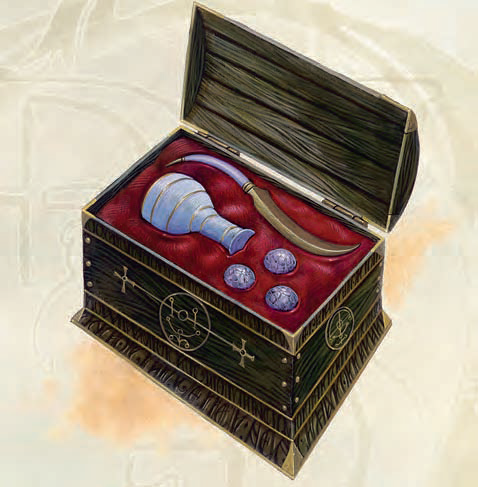
Implements of Binding: It's a chalice, knife, and three stones that you put around the binding circle at the time of the binding process. You put the stones around the circle, cut yourself with the knife (for one point of damage) and drip it into the chalice. In return you get between a +2 and a +8 bonus on your binding check (depending on the quality of the magic item). It's just a slotless way to get a bonus on binding checks for the low cost of a hit point. Not terrible.
Soul Lens: It's a monocle that increases the DC of your vestige abilities by 1. Presumably it also allows you to show comical surprise at the audacity of young hooligans.
Seal of the Spirit: It's a silk rug with a vestige symbol woven into it, it allows you to forgo the 1 minute drawing session that's required of a vestige... but it doesn't allow you to ignore the special requirements of that vestige. E.G. there's no functional way for it to work for Folacor or Tenebrous since they require the seal to be drawn in a specific medium.
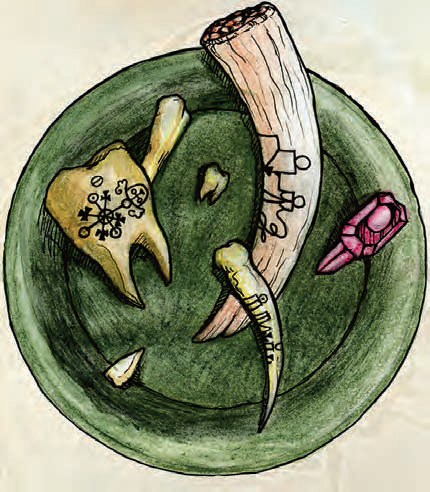
Teeth of Dahlver-nar: Another slotless wonderous item, you knock out one of your teeth and replace it with one of the Dahlver-nar teeth and you get an ability similar to one the vestige grants. I say similar because they aren't direct one to one associations. For instance Ipos gives you a +4 enhancement bonus to intelligence. Now I just heard someone's inner twink squeal with glee at the thought of slotless enhancement bonuses, but I'm going to have to rain on your parade. For as long as you've got a tooth in your mouth you automatically show the vestige's sign and are affected by their influence. You could, in theory, replace all of your teeth with all 32 Teeth of Dahlver-nar but you'd probably end up with a -10 attack bonus by the time everything's said and done.
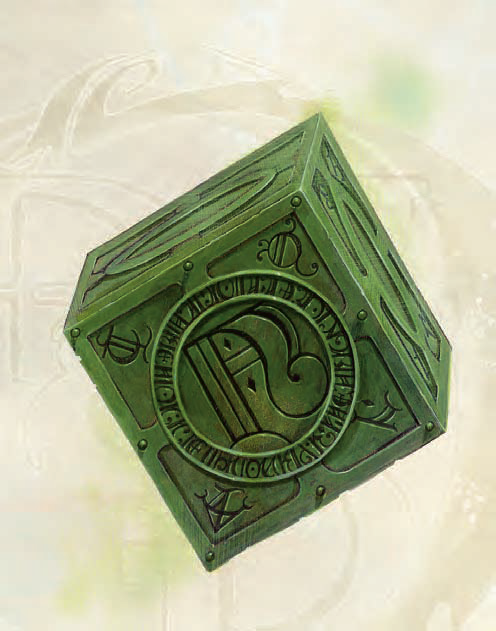
Vestige Phylactery: You can bind an extra vestige into the Phylactery once per day, and then once per day you can take the vestige out and immediately bind to it. If this would put you over your limit one of your vestiges just unbinds with no fuss. It's pretty good if you need to do something like have Buer on hand for emergency healing.
Up Next: Monsters, Organizations, and Locations. Spoilers: There is an organization devoted to killing Binders and they get the majority of the page time
Pact Magic Monsters and Organizations
Original SA postSo yeah remember how I was doing a review of the Tome of Magic? Well, July was a busy month for me what with the trip to New York
the crippling leg injury
the hospital stay
the surgery
well at least I've got my laptop so let's hammer out the rest of this chapter.

Pact Magic Monsters and Organizations
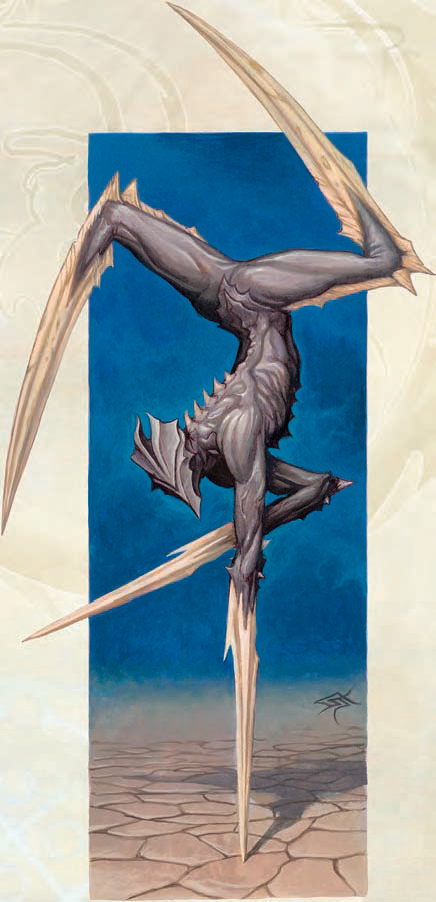
The Deadly Dancer
Aberrations that are theoretically linked to Paimon due to their appearance, the long bony blades are actually porous to allow them to absorb the blood on which they feed. They need to soak their blades in blood once a week or they starve to death, so even a short period of poor hunting can drive them to attack humanoid settlements. They cannot speak, as their own language is a dance filled with complex gestures. They can learn other languages however.
Their society is little more than nomadic hunting parties that hide from other races. Since they can't easily build shelter (what with having knives for hands) they gravitate towards warm climates that offer ready made shelter, such as caves. During a hunt everyone participates, even the young.
They are sexless creatures, each one can procreate alone by breaking off a blade in the corpse of a medium creature. It then slowly absorbs the nutrients it needs and grows into a new full grown dancer in seven to ten days. The process is painful to the parent, however, dealing roughly half their health in damage and causing to lose one attack from their full attack routine, as well as the ability to make whirlwind attacks. They don't regain these abilities until the blade regrows in about a month. Furthermore, about half the time the blade doesn't break cleanly and causes a wound that continues to bleed. Their culture lacks the concept of a cleric and they can't really bind wound with fucking knives for hands, it usually means death for the parent. Thus dancers are usually only willing to procreate if its own death or the destruction of its troupe is certain.
Knowing how loyal dancers are to their troupe, some slavers have captured the creatures for uses as assasins, gladiators, or guards. By keeping the majority of the troup captive the ones that are free are kept in line.
They seem to revere Paimon as a deity, they mark their territory by scoring trees and stones with paimon's seal, and troupes of them sometimes gather to engage in week-long revelries where they dance in complicated patterns to scribe Paimons seal over a large clearing. Despite these facts they seem to be incapable of becoming binders.
They never stop dancing, their blades are basically scimitars, and they can attack with 3 in a full attack. As well as having whirlwind attack and improved uncanny dodge.
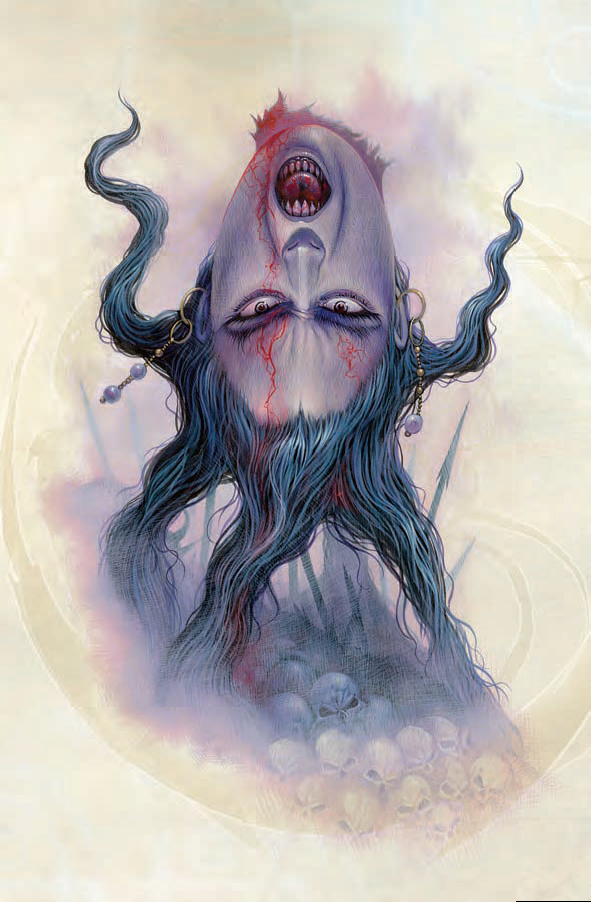
Deathshead
"Hi there Binder Bill"
"Hey there Necromancer Ned"
"You know that Vestige Shax, the giant who's head fell off?"
"Yeah?"
"Well I was watching you yesterday and decided to decapitate a cloud giant and reanimate her head."
"..."
"I was bored?"
Deathsheads concentrate all the life force of the previous creature into the head, creating a creature with incredible knowledge of all subjects and persuasive ability. It only has the slight side effect of being able to dominate anyone it touches. Whoops. This does lead to this rather hilarious description
quote:
Although it can be fearsome in melee, a deathshead generally prefers to employ a foe as a weapon against other enemies. Typically, it dominates the best combatant sent against it, then rides that individual into combat against its other enemies. During the ensuing melee, it often tries to capture and dominate a spellcaster so that it can finish off the others or escape. Because a deathshead usually rides foes without a saddle, it takes a –5 penalty on Ride checks for riding bareback. A deathshead that dominates its mount automatically succeeds on Ride checks made to guide with knees, leap, spur its mount, and control its mount in battle, and the dominated creature is considered a war-trained mount.
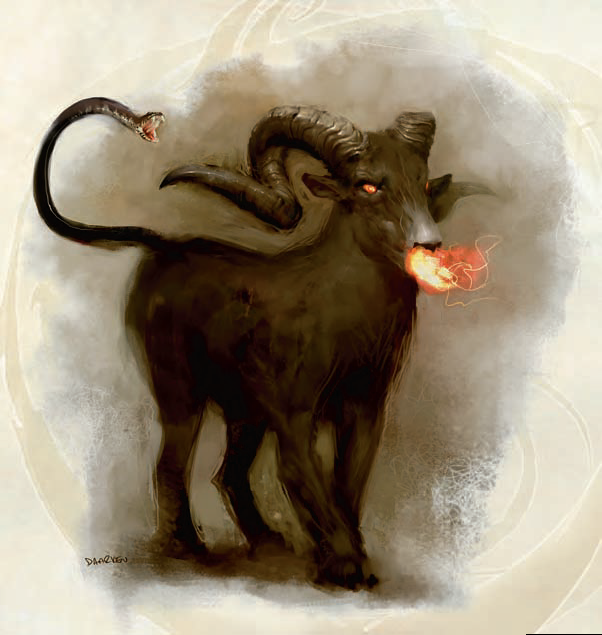
Horned Beast
Legend holds that long ago Amon was attended to by flocks of golden beasts. When he fell into darkness his flock followed suit. Now they're evil as evil can be, hunting prey over rocky terrain and constantly seeking new victims to terrorize. They're not very bright but they enjoy malicious acts and delight in the fear they can inflict upon others.
It can bite with the goat head, bite with the snake head (it even has poison) and breath fire.
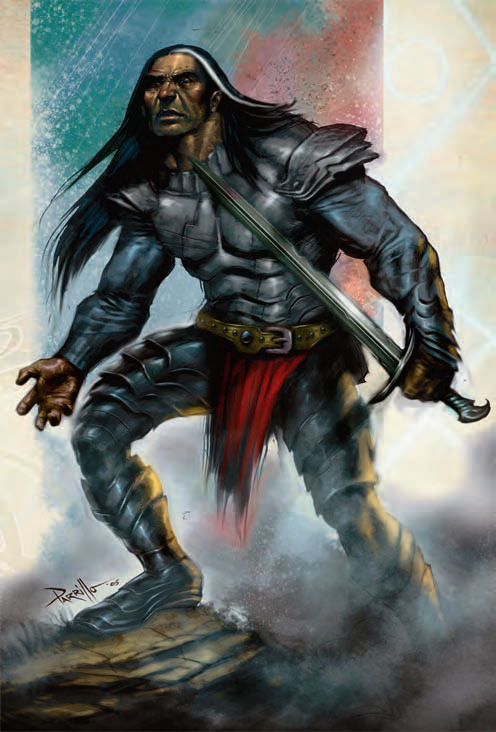
Karsite
Hey who wants another obscure PC race for minmaxers to obsess over? Nobody? Too bad.
They're counted as human except without the feat and skill point. Which seems bad except they get +2 to con and cha, DR 5/magic, Spell Resistance equal to 10+HD and they heal 2hp per spell level resisted , the ability to force people they strike in melee to make a will save or have their armor/shield/weapon turn off for a minute, proficiency with light and medium armor and all martial weapons. In returnt they come with a somewhat hefty +2 LA and an inability to cast any arcane or divine spells. However they can use SLAs, psionic powers, and magic items. So yeah, say hello to the Warlock/binder minmaxer's dream race.
When Karsus lived he was a powerful wizard and sired many children amongst his slaves and supplicants. His failed attempt to steal power from the diety of magic shattered the empire and spread his children across the world. Thus his bloodline has tainted nearly every human empire, and at times it grows strong enough for a human to birth a karsite. They breed true amongst themselves.
They appear human overall but there are two distinguishing traits. First they all have heterochromia, one light blue eye and one eye of a normal human color. Second of all they have a shock of white hair on their head. In communities where Karsites breed exclusively with one another, other features begin to breed in, straight blond or black hair, a sharp widow's peak, and a small nose and mouth.
Karsites as a society are united with purpose: to rid humanity of arcane spellcasters and establish the worship of Karsus as the only god. Accomplishing this would have the slight side effect of establishing Karsites as the ruling caste of humanity because of their divine bloodline. They work towards this goal in many ways, discrediting the good works of heroic spellcasters, preventing the founding of temples of the gods of magic, stealing magic items and ruining their creators, and taking leadership roles in human settlements. However they carry out all their work in secret. Despite their evil natures they loathe killing
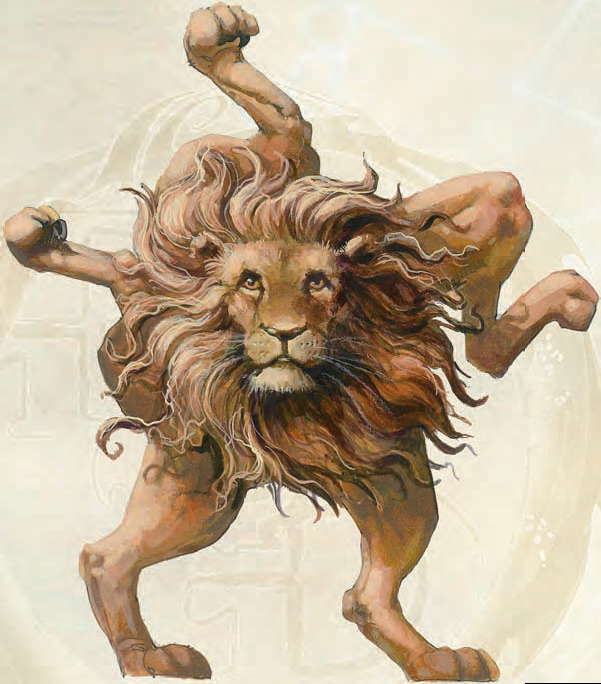
Roving Mauler
Five legged wheel lions. There's not much more to say. They hunt in prides like lions, and they sometimes occupy the same territory. Maulers tend to favor larger prey but they do not hunt any creature that can grapple them and hold them down (such as lions) and will give up a kill to such a creature.
In particular they have earned a reputation for attacking caravans and campsites at night. They usually only kill beasts of burden, attacking humanoids only if they interfere. But if they don't have any animals they'll run down anyone unfortunate to be in their path.
Their unique ability/combat feature is that they can tumble through anyone's space, no matter how big they are, and anyone who gets in the way gets a claw attack. Even if they fail the tumble check all that means is the guy they roll over gets to attack them in return.
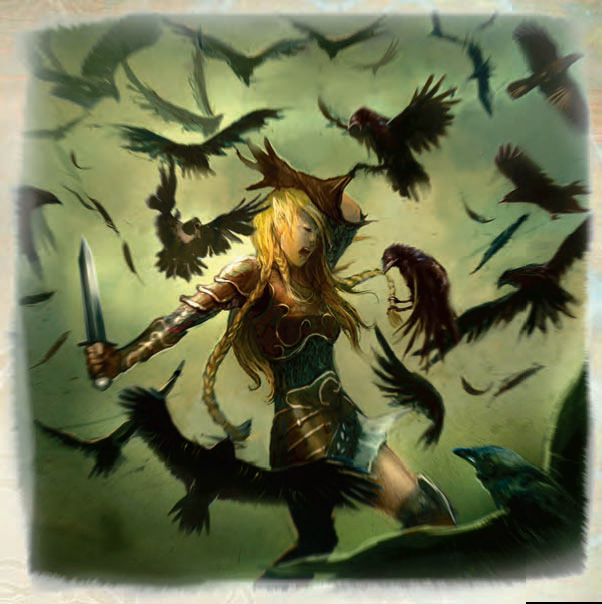
Swarm: Murder of Crows
It's.. just a swarm of crows. The only thing it has to do with Binders at all is this throwaway paragraph.
quote:
Crows have always gathered in great flocks, but the first records of such flocks attacking creatures appear after Malphas’s death and transformation into a vestige. Binder scholars note that it was not until this time that such flocks were called unkindnesses.

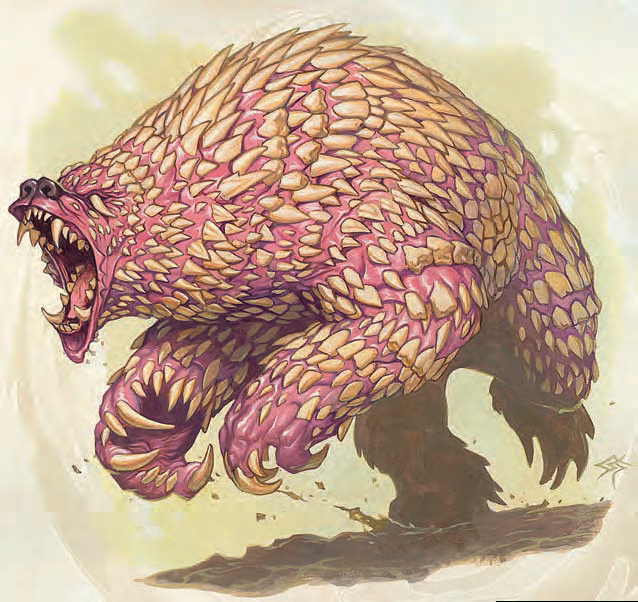
Tooth Beast
Tooth Beasts roam the Underdark, making their homes in cool caverns that provide easy access to water. Sometimes they roam closer to the surface, living in caves and venturing out when prey draws near or when the weather duplicates their favored environment.
They use their keen sense of hearing to hunt. They listen for distant prey and move slowly towards the sounds, hoping to get close enough to frighten the creatures. The noise of a combat often draws tooth beasts, and many Underdark denizens simply leave their dead and dying on the field of battle when a tooth beast shows up to avoid facing it themselves.
It apparently is tied to Dahlver-Nar but no one knows specifically how.
Tooth Beasts are very slow (10 ft) but if there's anyone in it's blindsight range that's subject to a fear condition they can move 60 feet(or charge 120 feet) to end their movement next to such a creature. To facilitate this they have the ability to unleash a Frightful moan in a 30 foot radius. They attack with their claws, 'bite' with their claws, and rake their prey across the many sharp teeth on their body.
Pact Magic Organizations
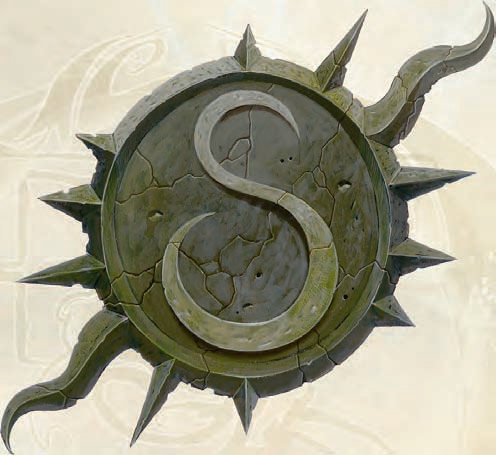
The Order of Seropaenes
Ages ago the Scholar Syfal uncovered the treatise on vestiges that lead to the rediscovery of Pact Magic. This itself wasn't a problem, the issue was that these creatures existed outside of the divine order. When Syfal spread news of these creatures, it eventually reached the ears of those in the larger churches. Knowing that gods held power primarily through mortal belief, the church leaders feared that Syfal's teachings would draw mortals away from the established religions. They feared that if the binders persisted they would rival or displace the gods.
Enter a priest of Vecna named Seropaenes. He summoned the elders from the established churches to a remote site in the Crystalmist Mountains. Attendance was sparse, with only clergy from the churches of Heironeous, St. Cuthbert, and Wee Jas in attendance. He proposed that the churches unite under a common banner - one that would not compromise the strictures of their faiths and guarantee the integrity of their respective dogmas. Desperate to avert the threat posed by pact magic, they agreed.
At first the order operated in secret, with members devoted to certain gods kept isolated from those devoted to opposing deities. Still it was highly effective. Its member swept through the lands, retrieving forbidden grimoires, imprisoning binders, and crushing the heretical uprising. Word spread, and soon other members of the parent churches realized what was happening. Although they agreed that the thread presented by binders was great, the alliance with agents that served the gods of their enemies caused a great upheaval. How could paladins of Heironeous bind together with Vecna's necromancers. Was the threat so great that good and evil had to unite against it? Publicly the member religions denounced the order and banned it's practices. But some secretly funded it, continuing the crusade.
The order veiled itself in a cloak of secrecy, and over the years, most of the churches forgot about it. Records of its existence were quietly cleansed from the annals and sacret texts of all faiths. So complete was the destruction of the evidence that not even the highest-ranking members of the Church of Heironeous now know about the order and its mission.
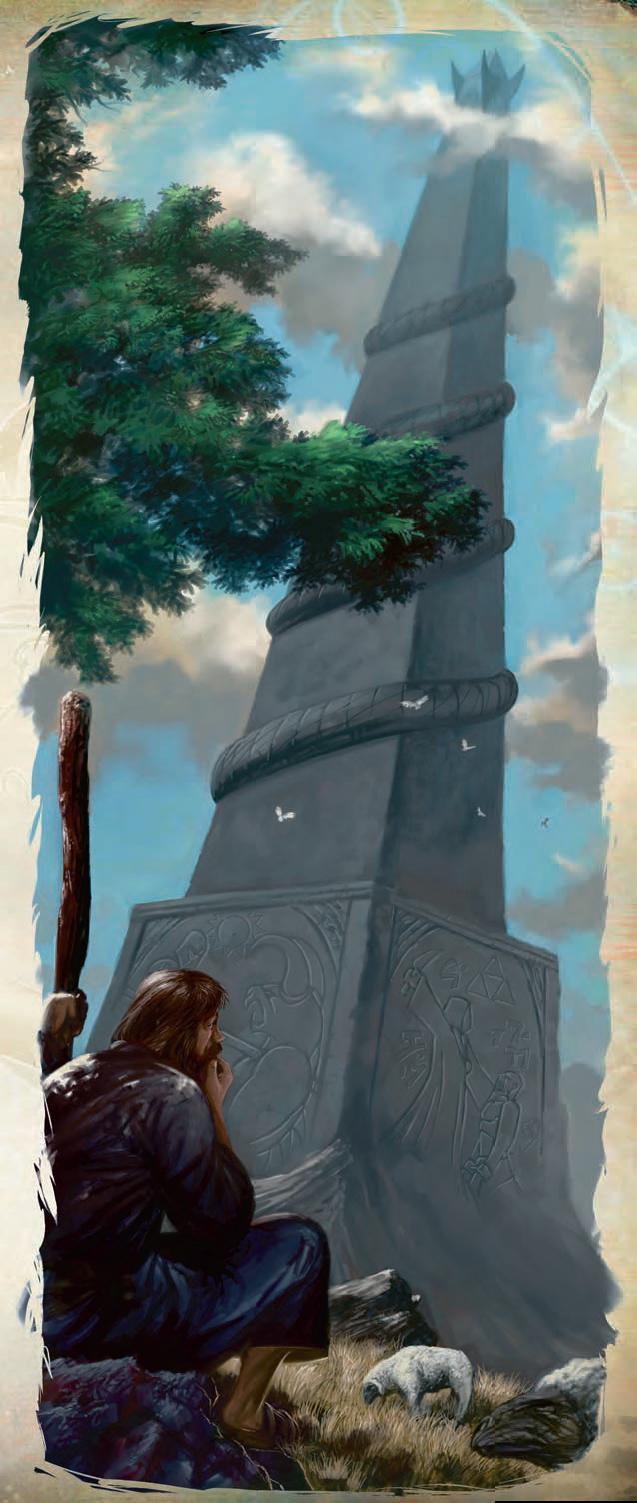
The headquarters of the order is a massive obsidian tower high in the mountains known as the Tower of Woe.
Unbeknownst to most/all of the order, on the plane of shadow there is a echo of the tower, The Black Spire, calcified from the evil and suffering that occurs within the Tower. The church of Vecna works from the Black Spire to try and corrupt the order and bring it under the rule of Vecna. It's worth noting that the Representative of Heironeous had his suspicions about the Church of Vecna but died months ago under suspicious circumstances. Also the Representative of St. Cuthbert is evil as sin. Sooooo, you know, surprise this was probably a bad idea."
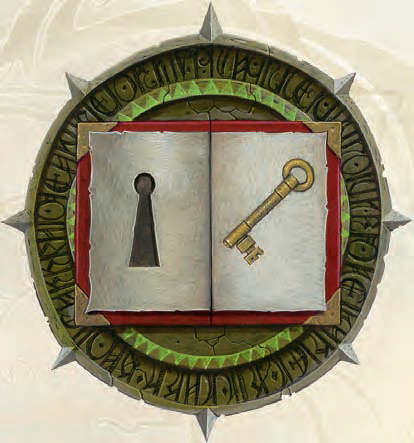
The Theurgian Society
The Theurgian society just kind of exists. They're there because the game needs an organization that doesn't want to kill PC binders on sight. The lore for it is literally "Syfal left a bunch of lore behind before he got murdered by the Seropaenes, someone found that lore and founded the Theurgians."
And that's it for Pact Magic, next time I'll go over Shadow Magic.
Shadow Magic
Original SA postIt's time for the next bit of the Tome of Magic not as good as the Binder chapter but it's still kind of neat.
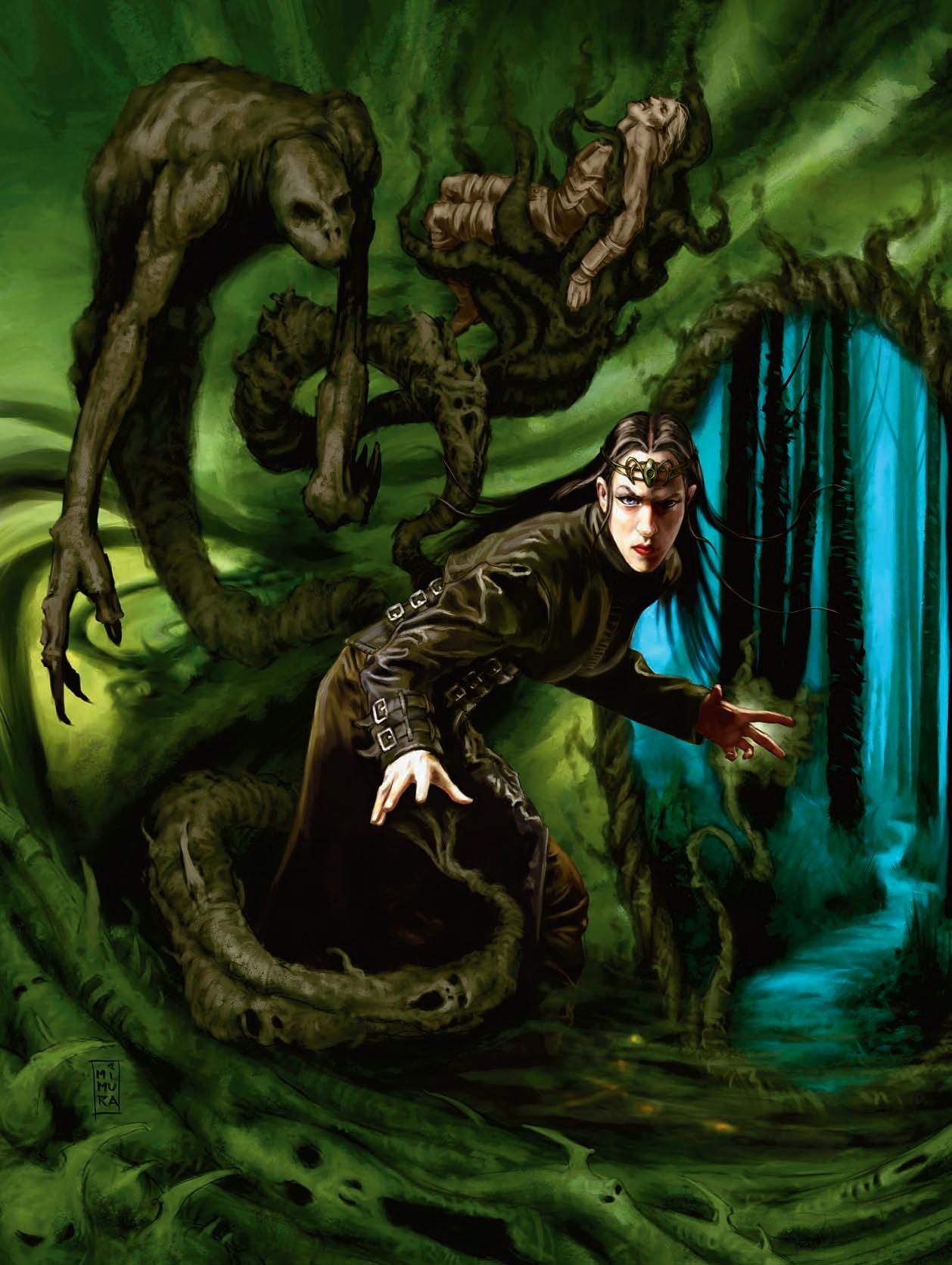

The shadow magic chapter opens up with a fairly standard nihilist treatise. "Before creation, darkness was all" "The brightest of suns must dim and gutter." "Day may banish night but night always returns" "Darkness is the only truly eternal concept, the ultimate force, the final result of every effort, and therefore it is the strongest." Basically standard stuff you'd hear out of a teenager who just discovered black jeans.
This is kind of odd, because that's not what shadow magic is. Sure it's
shadow
but shadow magic is all about sympathy and reflection. Sympathy is standard voodoo stuff, I take a lock of your hair and it gives me power over you. I do something to your shadow then something happens to the person that is casting that shadow. That kind of thing. Reflection is the magical equivalent of Newton's third law. For every action there must be an opposite. But in most cases it's not really a thing that's noticed. Pelor doesn't notice when one of his clerics casts cure serious wounds because he's just that powerful. The Plane of Fire doesn't give two shits that you pulled out some fire to cast fireball. Shadow magic uses these effects, creating strength from weakness and darkness from light.
The most obvious kinds of shadow magic that you'll find outside of this book are Darkness spells and Illusion magic that uses shadowstuff, like shades. Negative energy isn't shadow magic no matter how much people may want it to be. and Shadowdancers might be shadow mages but the jury's still out on that one. but we don't have to settle for that.
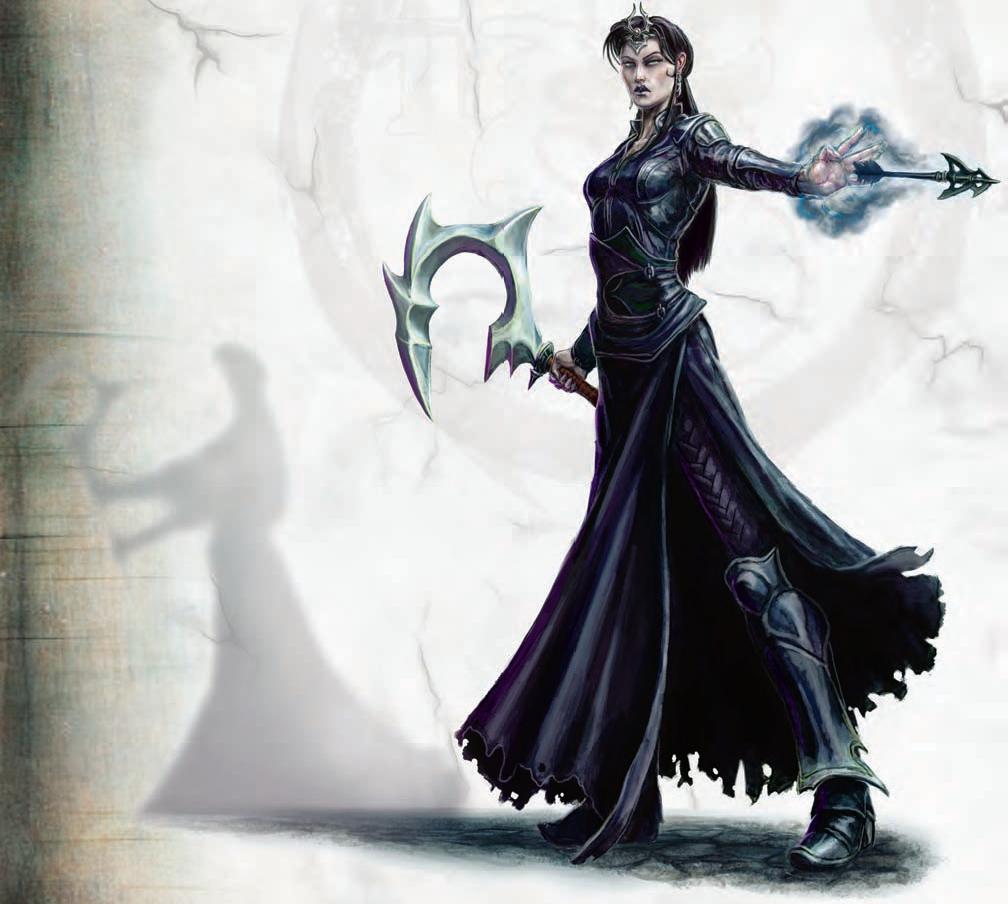
The Shadowcaster
“Behind the fire, between the worlds, in all the empty spaces, at the end of all things, we are there. Matter, light, life—these things are fleeting. Shadow, only shadow, is eternal.”
—Eddas Coradran, Lord of the First House, Parliament of Shadows
I love the subtle details in the art in this chapter, take a closer look at her shadow and what it's doing.
Anyways, Shadowcasters are a 20 level casting class with most of what that entails, they've got 2+int skills, 1/2th BAB progression, simple weapon proficiency and no armor proficiency. They do however get good fort and will and a d6 hit die, which is good I suppose.
The major difference is that a shadowcaster only learns one spell(known as a Mystery) per level, and they can only cast those spells once per day. They get a few cantrips (known as fundamentals) that they can cast more often but the cantrips aren't anything earthshattering. They're also a Multiple attribute dependent casting class. You need to have an intelligence equal to 10+ the mystery level to be able to cast a mystery, and the save DC is 10+ Mystery Level + your cha mod.
There are three 'classes' of Mystery, Apprentice(Governing levels 1-3) Initiate(Levels 4-6) and master(Levels 7-9) and each class of mystery is further subdivided into paths. Each path has one spell of each level, and to select the higher level path mysteries you must know all the lower level ones. Also to learn a 2nd level mystery you must know two first level ones, and to learn a 3rd level you must know two 2nd level ones. This restriction isn't maintained between categories, meaning you can pick a 4th level Mystery as soon as you have access to it. You can select a mystery more than once if you want to cast it more times per day but this doesn't count extra towards gaining access to higher level mysteries.
Also: as you gain access to higher tiers of mysteries, the lower level ones get easier to cast. Once you get access to 4th level Mysteries, your 1-3rd level become spell like abilities instead of spells, meaning they no longer have somatic components, and you can cast each one you know twice per day. Once you gain access to 7th level mysteries your 4-6th level mysteries become spell like abilities and get an extra use, and your 1-3rd level mysteries gain an extra use and become Supernatural abilities. And your fundamentals gain an unlimited number of uses as well.
And because this wasn't confusing enough, you gain bonus feats equal to half the number of paths you have access to, incentivising you to select Mysteries across a bunch of paths, but meaning that you will never have access to the spells that would make those feats worthwhile.
You also gain darkvision and your close association to shadow slowly supplants your biological functions eventually meaning you don't need to eat, sleep, or breathe. But that doesn't really make up for the fact that you start out really really weak and you need to have a complete 20 level roadmap set out from level 1 to figure out how to make your class function. There are ways to game the system and abuse the functionality of mysteries but sometimes it doesn't really seem worth it. I mean sure some of the mysteries are
very good
but you only get 20 of them and you only get one shot of your very best stuff. They're all the inflexability of a Sorcerer's with fewer spell slots than a universalist wizard. There's some unofficial errata from the author that makes the class slightly better, and some other unofficial errata from wotc's lead playtester at the time that makes the class much better, but as written there's little reason to play a shadowcaster apart from flavor.
That said, the flavor you do get is pretty good.
There's a sidebar here mentioning that a good way to emphasize the 'alien' nature of shadow magic is to allow an arcane caster to multiclass into shadowcaster and have it slowly start 'eating' their wizard levels and turning them into shadowcaster levels. Which is interesting but it sounds like all it would do was make you even weaker for a few levels before you get 'stronger' but still not as strong as a wizard would be.
Feats
There are a few "Metashadow" feats that are more or less what you'd expect them to be. Save that they're once per day and don't increase the Mystery level. Empower, Enlarge, Extend, Maximize, Quicken, and Still are here. Though still by definition only affects Mysteries cast as spells. The two interesting Metashadow feats are
Line of Shadow
which lets you ignore line of sight and effect as long as you have seen them within a number of rounds equal to your int bonus, and they get a bonus on any save required equal to your int mod. Though the spell can't require an attack roll. There's also
Reach Mystery
which turns a range of touch into a 30 foot ray.
Path Focus
,
Greater Path Focus
, and
Nocturnal Caster
are semi-related. Path and Greater Path increase the caster level and save DC of spells of a certain path by 1 each, and Nocturnal caster increases your caster level for a path (or school of magic, anyone can take the feat if they can cast a spell with the darkness descriptor) as long as it is night time. Ambient light doesn't matter it's literally the time of day.
That done, we can get into the more interesting feats.
Shadow Cast
is one of my favorites, for the low low prices of 5 ranks in concentration and 1 level of shadowcaster, you can move your shadow to a square adjacent to you and have it cast the spell. If enemies don't threaten that square you don't provoke attacks of opportunity for casting spells or Spell like abilities.
Shadow Familiar
gives shadowcasters access to a familiar with the dark template that's otherwise identical to a wizard's familiar.
Shadow reflection
requires that you be able to cast one of two level 3 Mysteries, but it gives enemies a 50% miss chance to hit you with AoOs, which you probably won't be provoking many of if you took Shadow Cast.
Shadow Vision
requires 15 Wis (unlikely, considering you need int, cha, and dex to be relatively high) and for you to know either a specific 1st level mystery or 7th level mystery(
 ), in return you can spend a move action while you are within shadowy illumination or darkness to learn the number and direction of all creatures that are within 20 feet of you and also in shadowy illumination or darkness. This doesn't actually let you target anyone so it seems like a lot of work to get basically nothing out of it.
), in return you can spend a move action while you are within shadowy illumination or darkness to learn the number and direction of all creatures that are within 20 feet of you and also in shadowy illumination or darkness. This doesn't actually let you target anyone so it seems like a lot of work to get basically nothing out of it.
Finally there's the feat that kind of breaks the math,
Favored Mystery
favored mystery knocks the mystery down a tier, effectively. Meaning that if you took it for a master path Mystery, you could cast that Mystery twice per day as a spell like ability. If you really really wanted to you could take one spell with every single one of your 9th level mystery picks and get access to the "Make a will save or die and I reanimate your corpse as my slave" spell 8 times per day.
Prestige Classes
Shadowcasters can classify for a spellcasting prestige class as long as it only requires a non-specific caster level or access to spells of a certain level. If it specifies arcane or divine the Shadowcaster is out.
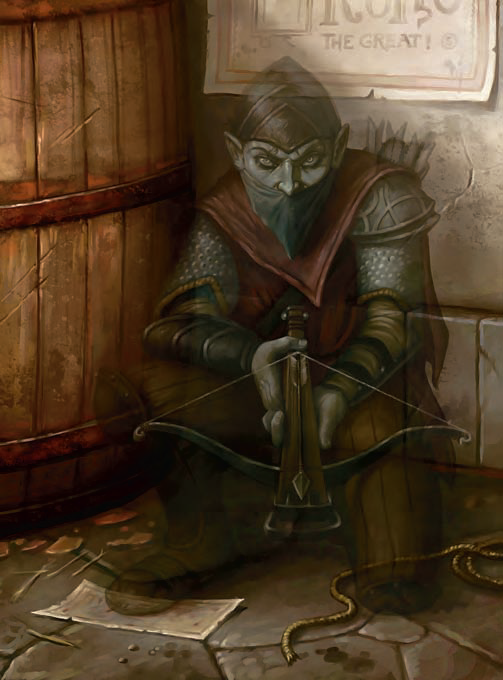
Child of Night
“Watch and read until the coming of final night—it will not avail you. To comprehend the magnificent and empty beauty of darkness, it is not enough to study shadow; you must become shadow.”
—Lara Bethendé, former Lady of the Second House,
Parliament of Shadows, now renegade
The Child of Night is an alternate progression for the Shadowcaster that other casters can get access to as long as they can cast shadow spells. It's only real requirement is 8 ranks of Know: Planes and Know:Arcana and the fact that you must have visited the plane of shadow at least once.
As you progress you become more epheremal and translucent(Gaining a bonus equal to your class level on hide checks) Eventually you can cast Blur a few times per day before becoming a permanent effect at 8th level, and at 10th level you can cast displacement twice per day. You also gain the shadowcasters "don't need to eat drink or sleep" abilities, but at a faster rate. Gain a decent amount of Cold resistance, and can flat out turn incorporeal for a minute once per day as a capstone ability. The only thing you're giving up is access to bonus feats, the eventual unlimited usage of fundamentals, and one level of spellcasting. If you're wanting to be ridiculously sneaky you could do worse.
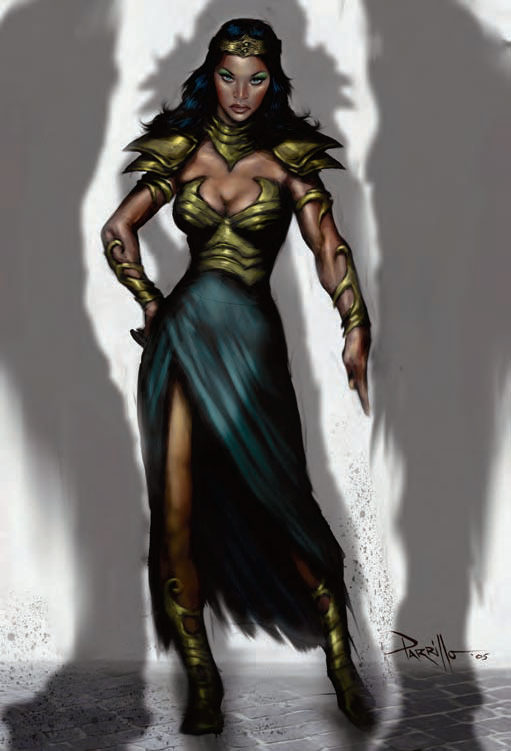
Master of Shadow
“What need have I of living servants when the shadows themselvesrise up at my command?”
—Thanielle Tiergun, Duchess of Ohr
This class builds entirely off the Shadow Familiar feat. Upon taking your first level of this class it splits open and a medium shadow elemental rises up out of it, ready to do your bidding. It loses all benefits of being your familiar (including the pesky lose XP if you die thing) and gains some of it's own bonuses more on par with a druid's animal companion. Oh and you gain a d8 hit die for these levels, which is nice considering all you're giving up is a level of spellcasting and the bonus feats/eat-sleep-breathe stuff.
You can spend your standard action to give your elemental additional abilities for one round like extra attacks, extra damage, damage reduction, the ability to move things in the corporeal world, etc. at 5th level you only need to spend a move action (meaning you could give it 2 things) and at 10th you can use your swift action as well (meaning you could give 3). Though some of them are pretty hilarious. Like Fast Healing 1 (for one round), or DR 5 (it's incorporeal), Reach(it's incorporeal), or +30 movement speed (it winks out of existance if it gets too far from you). It's not terrible and an okay option if you really don't mind missing out on that 20th spell.
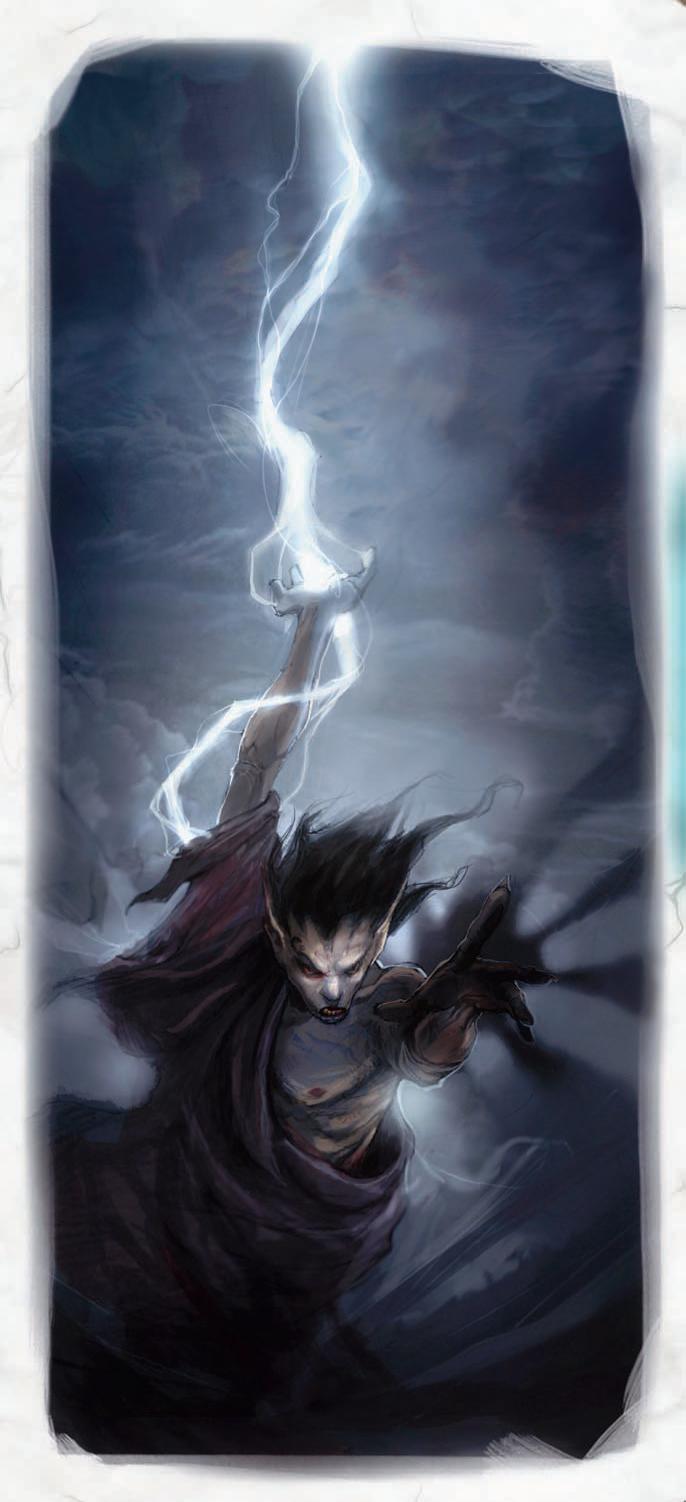
Nocumancer
“Consider the power offered by magic, by the ability to manipulate reality. Imagine how much greater, then, the power available to he who can manipulate magic itself.”
—Eveneth Stillwater, Lord of the Third House,
Parliament of Shadows
Noctumancers are the Eldritch Theurge of shadow magic and arcane magic. Requiring the ability to cast 2nd level arcane spells and mysteries. More interesting than that is that they are basically caster hosers.
When they counter a spell they gain a bonus to their next spell caster level equal to half that spell's level. They also gain the ability to counter a spell without using an action a number of times per day using a spell/mystery slot of the opponents spell or higher. And if they successfully eat it they convert their spell into a spell or mystery use equal to half that spell's level. They also gain the ability to impose a -4 caster level penalty on someone for one minute a few times per day, meaning that they probably lose access to their highest two tiers of spells. At 10th level they can create a 20 foot vortex centered on themselves that does it to
everyone
that isn't them. Also at 10th level they gain straight up immunity for 1 minute to any spell they counter.
If you want your party wizard to absolutely
hate
you, sick one of these guys on them.
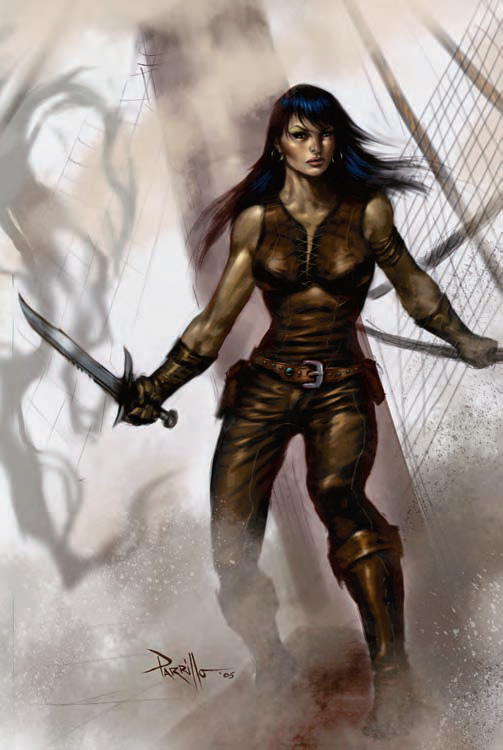
Shadowblade
“Don’t be afraid of the dark. Be afraid of what’s in the dark.”
—Niko Drendol, captain of the Black Dawn
These guys are the martial shadow class, sort of. They require a mixture of high bab and some stealth skills requiring multiclassing or waiting until a very high level to get access. In return they get some... not so great class features.
The main thing they get is Unseen weapon, and they get one use per class level per day. They can spend a use as a swift action (meaning once per round) to get a bonus on their next attack. What bonuses you say? I'm glad you asked. They can ignore concealment on one attack. They can deny their opponent their dexterity bonus on the next attack. They can deal 2d6 extra points of damage on their next attack. They can gain 10 feet of reach on their next attack. and at 10th level they can use unseen weapon as a free action meaning they can spend multiple uses per round though they're still limited to 10 per day. So I guess you can dump all 10 into a 20d6 nova round but why would you.
They also get sudden strike (I.E. only when the opponent is denied their dex bonus, oh hey look at that unseen weapon class feature) and a bonus on hide and move silently checks.
There is literally no compelling reason to take this class over a rogue.
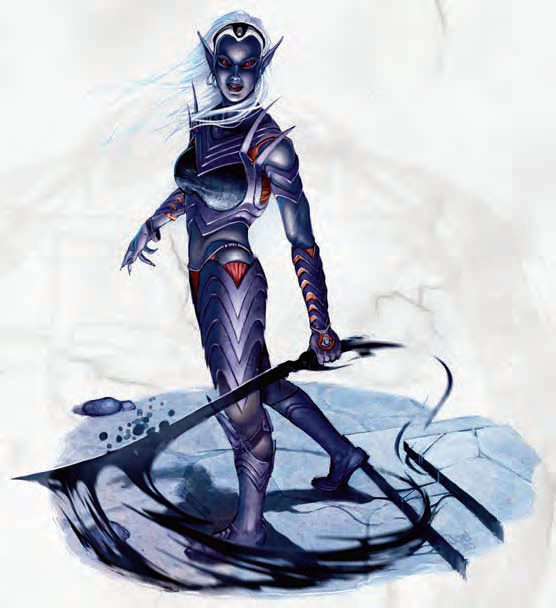
Shadowsmith
“You think me unarmed. You think me helpless. So long as there is night and day, I am neither.”
—Hrogar Ilgenson, shadowsmith and First Mate of the Fourth Dragon
In contrast to the last class, this one is actually interesting. The only requirements to get in are 5 BAB and some confusing skill requirements. Craft (armor, blacksmithing, or weaponry) 5, know arcane 3, and know the planes 3. So in theory a fighter could get into this class at 6th level if they dumped all their skills into it.
At first level you gain access to a single mystery, eventually you learn two more. You don't learn fundamentals and the only saving grace is that your saving throws are based off of your intelligence modifier. At first level you can use shadow to give yourself a bonus on climb checks equal to your level. At second level you can use shadow to give you a bonus on hide and move silently checks equal to half your level. At third level the class designer wakes up and realizes that the first two levels are bad and gives you something worthwhile.
As a standard action you can craft an object out of pure shadow, as long as it isn't flexible and doesn't have any moving parts. If you want to craft something specific you need to succeed on a relevant craft check. You can use it a number of times per day equal to your class level and it lasts for an number of hours equal to the same. At 6th level you can give the items you craft an enhancement bonus equal to your class level - 5. at 8th level you can create enchanted light armor for yourself.
At 4th level you can give yourself a deflection bonus to AC for 10 minutes a level a number of times per day equal to half your level (E.G. every combat in an adventuring day) and at 5th level you can spread your shadow-stealthy-ness to your party members for one minute.
Next Time: What the hell is a Mystery and are any of them good?
Truename Magic
Original SA postThe rest of the Shadow Magic chapter is exceptionally boring, and I've been super busy lately. But I can't leave you guys hanging without the actual money shot that brought you all here. So without further delay let's discuss Truenaming.
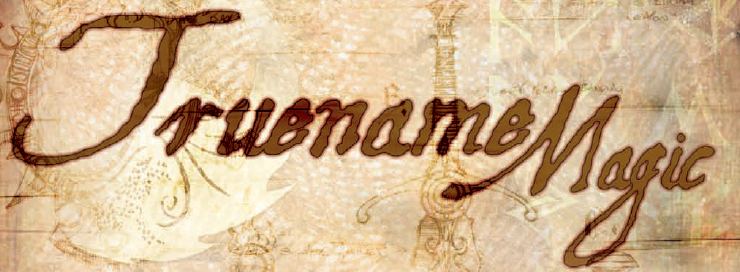
Truenaming is using the language of the universe. When spoken properly these words have tangible power. However actually pronouncing them is difficult, people can devote their entire lives to figuring out just one person's personal truename. And if you really really want to, you can spend hours of in game time painstakingly researching the ability to simply be adequate as well.
Truenames are ridiculously complex, with different inflections and intonations all over the place. There are entire books devoted to just explaining how to properly pronounce one word. But it's not simply just a list of names. Yes there's a name for "orc" and "Door", but there's also a name for "the orc berserker that is charging towards me right now" and "ironbound locked wooden door with something on the other side". So think of the most ridiculously specific tonal language you can and crank it up to 11.
There's a few pages describing how to use truenames at the table (assuming that the answer isn't "don't"). First of all it suggests training yourself to basically spew gibberish on command to use these spells. since “I disrupt thee, khedalaévaurümihauî!” is apparently better than “I daze the orc with an utterance; it’s DC 18,” even if the second is more helpful to your DM. If you can't do this on the fly they suggest creating the trunaming equivalent of magnet poetry, writing down a bunch of random syllables on strips of cardboard and pulling out a handful every time you speak a name, which is neat but also a bit more work than a wizard needs.
It also suggests becoming a multilingual translator and spokesman for the group as well as getting a fondness for spoken language. And pepper your speech with words from more poetic languages like elvish and draconic. "Keep maximum ranks in speak language, bluff, diplomacy, and intimidate to represent your mastery of the spoken word". There's also a part at the end about "Know how object saving throws work" because they're kind of confusing even before you bring the wonkiness of truenaming into them.
Truenaming is an int based skill, that only truenamers and people with the Truename Training skill can even take points in. To speak a creature's truename aloud you need to make a Truespeak check with a DC equal to 15+(2 X the creature's challenge rating or HD if it's a PC) if you're speaking a creature's personal truename the DC increases by 2. To speak a magic object's truename aloud the DC is 15+(2x the caster level of the item), and nonmagical items are a flat DC25. Note that you can also make truespeech checks against areas and the ground... but they forgot to give DCs for that meaning that there's an entire clade of Spells that you cannot use without the errata.
Those of you with even a slight understanding of math probably noticed the problem here. in 3.5 Skills increase linearly with the occasional jumps here and there for increases in their base stat. While the DCs that you need to make for these checks on an equal level target increase at twice that rate.
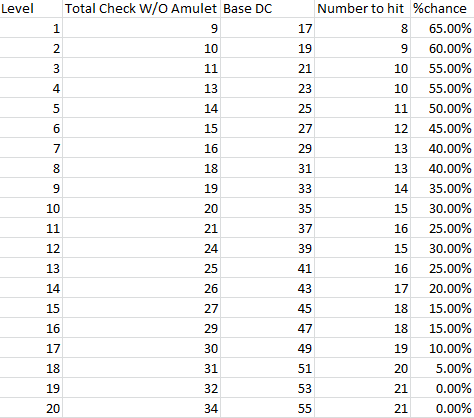
This makes the following assumptions, you start with a 15 in intelligence, skill focus(Truespeech), put max ranks into Truespeech at every level, and get the highest level headband of intelligence that you can as soon as it becomes avaliable.
When you truespeak at level 1, assuming you aren’t in a position where you’ll provoke an AoO, you have a 65% chance of success. That will steadily descend until it would be literally impossible to succeed at level 20. There’s a magic item that gives you a bonus on truespeech checks, known as the Amulet of the Silver Tongue. If we include the assumption that you are buying one of those at it’s earliest availability, we get this.
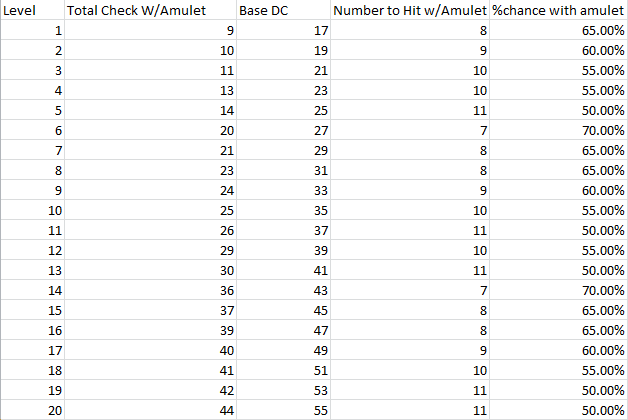
Note that this is just the chance to even succeed on casting the thing in the first place. It’s not quite that simple. The Law of Resistance states that for every time you successfully speak an utterance the DC to speak it increases by 2. Meaning that, at maximum, you are going to get 5 uses out of an utterance, and after the 2nd time you’re probably better off not even trying. The Law of Sequence states that you cannot speak an utterance while it’s still in effect. If an utterance has a duration of 5 rounds, you can’t use it again until it’s done. If you want to utter defensively you can voluntarily take a -5 penalty on your truespeech check… for each opponent that threatens you. Utterances are also suceptable to spell resistance but you can bypass that if you increase the DC by 5. Note that these aren’t ‘after the fact’ things, you have to decide before you speak. If you’re trying to bypass SR while avoiding the dragon that’s trying to claw your face open you need to take an effective -10 penalty on the check.
Oh, and most offensive truenames allow a save, based off your
charisma modifier
. You know, the one that you can't increase at any point without increasing your spell failure chance, and the one that needs the currently occupied neck slot to buff.
You can make potions and spell trigger items based on utterances but I would suggest against it. Potions only work on level 1 or 2 utterances, and only if the truespeech check made at the time of creation exceeds that of casting the utterance on the drinker. And spell trigger items only work against one creature. Meaning you need to know their personal truename, and if they afterwards increase in CR beyond the check made at the time of creation your item is now completely worthless.
Now then you can research personal truenames of other creatures, but if they're below level 10 you take a rather substantial penalty on the check since reality doesn't think they're too important yet, and they have to have an intelligence score of 3 or greater. Also you need to amass a number of successes on the relevant knowledge skill equal to half their hit dice. Not CR, hit dice. And each check takes 1 week. You can get bonuses on this check for things like "have sole unfettered access to a wizarding college library" and "know who their great great grandparents are", and you get bonuses for commune, divination, and legend lore spells.. but not just outright finding it out. As a final fuck you, each check takes 1000GP to even attempt.
So let's say that in addition to maxing out your truespeech skill you also max out every knowledge skill. And your level 20 Truenamer is preparing to fight his nemesis a CR 20 red dragon. Well.. to start you will only ever succeed if you hit a 20, because the only thing that was making truenaming itself work out was those amulets. But if you have a staff of research assistants, know who the dragons parents, grandparents, and great grandparents were, and cast commune, divination, contact other plane, and legend lore every single week while you are researching it, you will finally discover your nemesis' Truename after approximately 16-17 uninterrupted weeks of research, more if you're particularly unlucky.
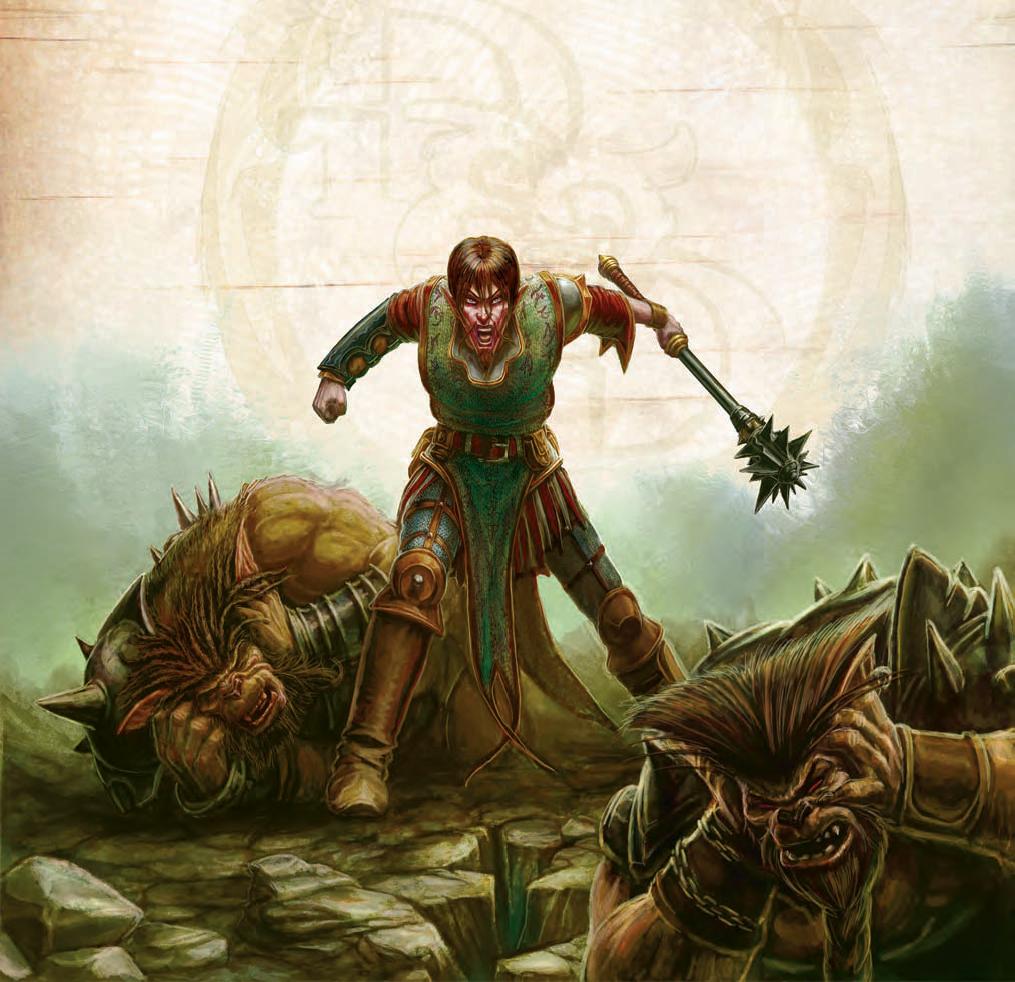
The Truenamer
I name you thelehb’maürechthalahh, tyrant. I rend asunder your petty spells with bhauo-yualé-mannarae. And I bring you to your knees with gorvoâtyrmu-lílautha. With only three words, I have you at my mercy.”
I just can't take those nonsense truewords seriously.
Anyways, d6 hit die, 3/4ths BAB, Good Will save, and 4+int modifier skills. Which means you will probably max out all of your skills eventually since you only have 5 non-knowledge skills, and one of those is craft, another is Perform(oratory).
Truenames are the only real feature they get. Though they do get some other things to make up for not being a wizard. It gets easier for them to research truenames, as they get a bunch of bonus feats related to knowledge skills. They get 2 recitation feats for free(I'll go over them later), they can scry for one round a day by speaking someone's personal truename. They can cast sending 3 times a day if you know someone's personal truename. And they can cast Truenames in an AOE, but of course there's a giant pile of rules. They have to be of the same type(Humanoid, dragon, giant) and the DC is the DC for the highest leveled creature in the group, +2 for each member beyond the first. Making it kind of prohibitive especially towards the end of the day. Probably the only really neat thing they get is at level 20, when they can come up with a true-nickname for themselves that they can teach to others. And if they utter the word(which doesn't need a truespeech check) you can choose to be instantly teleported to their side ala word of recall.
Recitation feats are feats that require a full round action and you speaking your own personal truename. Only two of them are really worthwhile. One that cures you of poison and one that cures you of disease. Another dispels any emotion effects on you but you can't do it if you're frightened or panicked. Another gives you a bonus on your next skill check involving manipulating something with your hands by 1/3rd of your caster level, and another gives you a natural armor bonus equal to 1/3rd your truenamer level for 1 minute as long as the only action you take is a total defense action.
There are also Empower, quicken, extend, and enlarge utterance feats but they increase the DC of the check, by a lot. Empower is +10, Quiken is +20. Extend and Enlarge are only +5, but the only way you're succeeding on a check at DC +20 is if you're targeting something 5-8 levels below you.
The prestige classes are... pretty bad, the only ones that are passable are the ones that are based on arcane/divine casting, and they still require you to max out your truenaming skill at every level to have a chance of success at anything.
I can go over the various utterances if people want but it's just... it's very weird. Probably the only neat thing about the utterances is that you can speak most of them backwards to get an opposite effect. The spell that heals your allies can be spoken in reverse to hurt your enemies. The spell that buffs your allies AC can be used to impose a penalty on your foes.
And you'd think that having a healing spell on the equivilent of an arcane caster would be pretty good, but you have to remember that it's not guarenteed to go off, and all the healing spells are only fast healing, over a duration of 5 rounds. They're healing 50 damage 4 levels after druids are casting Heal.